#so when we were collaborating doing that are then makes a narrative inconsistency
Explore tagged Tumblr posts
Note
Hey Jackal sincere question, is the quad all black werewolf thing something you don't like others in general doing because of its black trauma symbolism, or is it mostly just in this context with this dog person? Just curious!
It was with Dog specifically since we were collaborating. June’s Gévaudan form in her narrative is a representation of Black trauma and is a concept I came up with for Strawberry Moon. With us collaborating, I wasn't comfortable with the narrative inconsistency of using the visuals outside of that. Essentially in that image you had a white woman in a sexy pose infront of a woc that was drawn with a narrative representation of Black trauma, and that was what I was taking issue with.
Not to mention, Lacey had already been compared to June multiple times at this point since Dog and Ependa copied her design and tried to deny it. This felt like she was testing my boundaries with how much copying she could get away with and in one of the worst ways.
#ask#the black silhouette and quad stance is not a representation of Black trauma in traditional werewolf media#but the way I draw it / the intention/within the context of my narrative it is#so when we were collaborating doing that are then makes a narrative inconsistency#and that's just not good#especially with a heavy and sensitive topic like that#we either had to agree to make it a June specific thing since she was the only Black character#or be ok with all the characters being drawn in that way#and it would cause too much confusion and inconsistency to allow the other characters within this collaborative context to be drawn that way#i hope that makes sense!
22 notes
·
View notes
Text
Ten Questions for Writers
Thank you for the tags! @artsyunderstudy @roomwithanopenfire @youarenevertooold @emeryhall @monbons @larkral I'm eating up reading your answers because we're all so DIFFERENT.
How many works do you have on AO3? 9 (technically 10 but we orphaned one of them out of shame)
What’s your total AO3 word count? 99,978 (mine) + 7,531 (shared) + 9,991 (someone else's) = 117, 500 (total)
What fandoms do you write for? presently, Carry On but back during my high school ff.net days I did some Percy Jackson/Heroes of Olympus (Percabeth and some separate OCs), Alex Rider (OCs), The 100 (as an elaborate prank), Harry Potter (literally just a My Immortal parody), and Divergent (OCs) and if they weren't oneshots they were never finished.
Do you respond to comments? Why or why not? YES! I'm currently behind on my replies, but it's so fun! It's like a book club but for stuff I created!!???? Shit rocks. I fully didn't expect anyone to read IKABIKAM (my first fic on ao3) when I first published it and so every comment still feels like a miracle.
Have you ever had a fic stolen? No.
Have you ever co-written a fic before? Yes! I love collaborating because it gives me something to bounce off of. A scene partner. A ticking timer. It's like lifting a heavy object by yourself versus getting someone else to bear some of the weight with you. It's easier. I also find myself constantly seeking collaboration with other people even with my solo fics. I'm all up in those DMs pestering people both as motivation and as external processing. And by GOD, do you fuckers have some good ideas. Y'all make me exponentially better.
What’s your all-time favorite ship? SnowBaz but also in a very real sense...Percabeth. (You never forget your first.)
What are your writing strengths? I got my start with rping, so dialogue is really comfortable for me. I also think my training in other art forms (dance, music, theatre, film, academia) positively influence my approach. When writing action, I often mentally frame it as 'blocking' the scene or 'choreographing' the movement. When crafting sentences, I'm constantly evaluating the rhythm and rhyme and repetition (not to mention alliteration) as if it's a song, always searching for the perfect word or metaphor. I also listen to actual songs and pull the emotion from them, using them as character studies or a musical soliloquy. I imagine shots and then write what I see from the perspective of a director explaining the actor’s motivating thoughts. I constantly revisit my thesis, grounding the narrative in callbacks and a cohesive structure like it's an academic paper. And all those things combined create this kinetic cause and effect style I'm really proud of and tangibly improves every time I write something new.
What are your writing weaknesses? I do not have a firm grasp on proper grammar. I'm also really slow and inconsistent with my output because my process is so physically disorganized and meticulous which often frustrates me. I'm also impatient. I don't do wholesale messy drafts; I edit as I go and when I'm done I want it published immediately. I also fall victim to the white room syndrome with physical descriptions. Establishing shots? Don't know them. What a guy looks like? What they're wearing? Sorry, I haven't told you because it felt weird to jam in there. Outside of fanfiction, I also struggle with creating something from nothing. I'm a theologian rather than a god. I much prefer playing in a sandbox and exegeting meaning from someone else's grunt work rather than conjuring the wood and the sand myself. My writing is also incredibly referential to pop culture which I'm not sure would translate outside of fanfic, but I guess I'll cross that bridge if I ever get to it.
First fandom you wrote for? Divergent (big cringe)
Now tagging! @onepintobean @cutestkilla @theearlgreymage @thewholelemon @mooncello @brilla-brilla-estrellita @you-remind-me-of-the-babe @bookish-bogwitch @facewithoutheart @fatalfangirl @urban-sith @prettygoododds @valeffelees @ileadacharmedlife TELL ME HOW YOU WRITE YOU GENIUSES
21 notes
·
View notes
Note
A discourse ask: quackity doing a funny bit with the fiances stuff and then immediately dropping it and switching it into just friendships when lore got more serious isnt the pinnacle of queer representation actually. In general people really overestimate how progressive the dsmp was. Low-hanging "gay sex/flirting = funny" jokes got misrepresented as representation and stereotypical portrayals of abuse became groundbreaking and uber-realistic. None of the issues were handled particularly well and its a fucking live minecraft roleplay with far too many participants - of course they werent, theres no way under the circumstances. But um people really do not act like this.
strongly agree / agree / ambivalent / disagree / strongly disagree / don’t care whatsoever
ok so I agree that the way the fiances bit in particular was handled was genuinely hilarious. 12/10 queer rep nice going great work. bahahhahaha. However, I think the fiances thing is kind of an excellent demonstration of how the dsmp as a whole did make queer relationships feel commonplace and normalized: cc!quackity's "nah we're just friends" backpedaling is like, literally a surprising retcon (something something cc!q killed c!fiances so that c!quackbur could live. only for c!quackbur be killed by cc!wilbur, rip. highkey funny as HELL).
On the whole, I think this take is an uncharitable way of projecting the toxicity of a young, large fandom with lots of Progressive Purity Culture Problems onto a collaborative narrative written by a bunch of fairly young folks, plenty of whom are drawing on aspects of their own lived experiences for their characters.
There's lots of people projecting their own narratives onto this stuff. There are always people trying to make the dsmp something that it isn't. But that's not the same as saying that what's there isn't interesting or compelling or doesn't have cool queer characters?? People can be wrong about things in dsmp without dsmp having to be secretly bad???
Like, take your abuse example. I happen to think that the abuse in the prison arc was handled pretty damn well, and I don't actually think that was on accident. I think that it took effort and intentional writing to set up that scenario and those characters.
To say that the dsmp's nature and medium means that there's plenty of it that's not tightly scripted or that there are dropped threads or inconsistencies or that there exist arcs with oversimplifications... is not to say "oh well, we shouldn't take any of it seriously, it's just a dumb roleplay."
#discourse asks#like do you think that the person with a two + year old blog dedicated to analyzing this story is going to agree w you on this point.
30 notes
·
View notes
Text
Aside from anticipating getting my heart ripped out and stomped on during the dramatic developments that were teased in the upcoming quests, I'm also intrigued to learn more about Neuvillette because, despite apparently being notoriously impartial and proper as the Chief Justice, he does seem to have something going on: I can't tell yet if it's
a) a sense of doing things "for the greater good" b) naiveté regarding human emotional/thought processes, including his own, or c) active inconsistency/cognitive dissonance.
Or perhaps a combination of multiple factors.
He was completely unbothered by Navia lying to get into his office without an appointment (bypassing standard procedure), and now, according to the 4.1 trailer, he's apparently going to submit false charges against the Traveler to get them into the Fortress of Meropide--something that he stated earlier was taken very seriously and is itself potentially subject to criminal charges should it fail.
I'd attribute these with relative certainty to a) (possibly/partially b)) if it wasn't for one more inconsistency I noticed:
During Lyney's trial, discovering the true culprit was sufficient to acquit him without an additional verdict from the Oratrice.
However, when charges where pressed against Childe, after incriminating Marcel as the true culprit, Neuvillette subjects Childe to another round of judgment by the Oratrice, insisting that "This has always been the rule."
(Clearly not, because it apparently wasn't 'the rule' one Archon Quest ago...)
I realize that brings into consideration the additional factor of the Oratrice and how it operates, about which we still know essentially nothing--although Neuvillette apparently has a hypothesis and has previously considered the possibility of the Oratrice delivering an illogical verdict, so it's possible that I'm overthinking things, and this could simply be a subtle or backhanded way for him to produce a specific reaction from the Oratrice and hence kick-start the investigation, so to speak.
I'd hate to consider Neuvillette suspicious at all because he's so sensitive and kind on the inside that I want to believe he has nothing but good intentions, but I'm not good at speculating--I don't know enough about the story yet to draw any solid conclusions, even though some things just don't seem to add up. I think the same emotional naiveté that makes him so endearing as a character is probably a significant factor--that said, given that he's allegedly a very capable Chief Justice and has been around for hundreds of years, it's not unreasonable to believe that, in some regards, he very much knows what he's doing.
I find it especially intriguing in my particular thought process juxtaposing him with Alhaitham (my other favorite who, indeed, lives in my head rent-free), because... from a narrative standpoint, they're similar in that that they're both stoic as to be enigmatic, they both hold positions that grant them considerable autonomy, and they utilize said autonomy--as well as the abundant resources at their disposal--to assist the Traveler.
...But Alhaitham, on top of being incredibly perceptive rather than naive, is also incredibly consistent. Many players found find Alhaitham untrustworthy because he's highly self-assured and only agrees to collaborate with the Traveler under very specific conditions, with very little flexibility, refusing to bend to anyone else's will solely to appease them. As the Traveler later states, though, this actually makes him extremely reliable as an ally, because Alhaitham is candid about being primarily motivated by a strong sense of self-preservation. He's incredibly selective about how he expends his effort; he's unlikely to flat-out betray an ally because it would simply be too much work for him to set up a genuine, trusting, mutually beneficial relationship with someone, only to jeopardize it later. If he doesn't intend to cooperate, he just says so. ("Until you complete this task, you don't have question privileges" etc.)
Personally, I was inclined to wholly trust Alhaitham from the beginning due to this consistency.
Neuvillette, on the other hand, despite holding position as the Chief Justice, doesn't seem to invariably follow the rules and laws to the letter as one would expect.
As I've already stated, I do want to trust him--and indeed, he's open with the Traveler about the fact that he is actively in the process of investigating the Oratrice, and, even to him, there's just not enough information to draw any conclusions. Factoring in all of the above inconsistencies, though, I think it's as unfair to conclude that Neuvillette is downright nefarious as it is to assume, on the other extreme, that he's wholly benevolent, so I'm going to remain cautiously optimistic while I anticipate further developments from the Fontaine story in the upcoming version. 😆
44 notes
·
View notes
Text
Post-Production Summary + Reflection
Going into post-production, I was extremely excited to see Wuthered come together. What we managed to shoot on set was amazing and I really wanted to continue the tone and style of the film so far and further enhance this with the sound design and edit. In this post, I will summarise the lengthy process of post production and what we encountered and learned along the way.
The Edit:
The edit was both an exciting and complicated process. As we had shot so much coverage on set, it left myself and Leo with a lot of options regarding what we wanted to include in the final cut. This meant sacrificing moments for the sake of narrative sense and pacing, (which was of course painful to do!) which helped us refine our vision in the long run.
A more enjoyable part of the edit was collaborating with Leo to create a distinct style for the edit of Wuthered. There was specific moments of the film, such as the surgery scene and the final scene in Mr Mann's office, that we both knew we wanted to be slightly experimental. This was something myself and Leo had been discussing since pre-production, and it was fun to play around with this in the final edit. For the surgery scene, we landed on a glitchy, subliminal style of editing which we wanted to introduce again near the end of the film to create a sense of unease. For Mr Mann, we used shots of the panel and Mr Mann staring directly into camera to emphasise this feeling of being watched, putting the audience in Alison's shoes.
The main feedback we received on drafts of the edit were that we were not focusing on Alison enough. This is something we have gradually worked toward throughout our drafts of the edit, and I think we have successfully redirected this in the final cut.
Sound Design:
The process of sound designing Wuthered was also a very exciting journey. I think sound really pulls the film together, and reinforces the creative risks we have taken throughout the shoot and the edit. As we had previously sourced an original score, we had this as a base layer for the tone we wanted to create and a vague idea of where we wanted to include this in the film. The general vision we had was to create a different atmosphere for each location we visit during the film. This is something we built upon during our creative process, and I think comes across in the final film.
The only issue we came across in this period was the on set sound for the opening scene, as due to unavoidable sound on location there was a bit of inconsistency in the atmos. We managed to solve as much of this problem as we could thanks to Gaby's great work de-noising and layering sound to make it as normal sounding as possible. I think this issue was pretty much unrecognisable when watching the final film, but is something to keep in mind with locations in the future to avoid this issue.
Overall, I think the sound design really was the cherry on top of the film as a whole. It really affirmed the creative risks we took in other aspects of the film, and mainly helped us in creating moments of tension throughout.
The Grade:
As we had very limited time for our colour grader to work on the film, this proved to be a tricky process. While the majority of the grade was completed, the time limit we had meant that there was loose ends left for us to tie up without him. A few issues with masking remained, as well as having to swap out a shot that was unsuitable to use in the final film.
The main issue we encountered during the grade was meeting the expectations we had colour wise. As you can see in my previous post with my own colour graded images, I really wanted to push the colours in each scene. This worked for some, such as the audition scene and Alison's bathroom, but proved to be more of a challenge for Mr Mann's office. This was because of the way this scene was lit on set, the warm colour making it difficult to bring out the blues. Ultimately, this boiled down to a miscommunication between myself and camera, which I can learn from for future projects
Overall, I am pretty happy with the grade. I think it's all looking good, despite being slightly different from my original vision and I have learned a lot from the process.
0 notes
Text
The Green Knight and Medieval Metatextuality: An Essay
Right, so. Finally watched it last night, and I’ve been thinking about it literally ever since, except for the part where I was asleep. As I said to fellow medievalist and admirer of Dev Patel @oldshrewsburyian, it’s possibly the most fascinating piece of medieval-inspired media that I’ve seen in ages, and how refreshing to have something in this genre that actually rewards critical thought and deep analysis, rather than me just fulminating fruitlessly about how popular media thinks that slapping blood, filth, and misogyny onto some swords and castles is “historically accurate.” I read a review of TGK somewhere that described it as the anti-Game of Thrones, and I’m inclined to think that’s accurate. I didn’t agree with all of the film’s tonal, thematic, or interpretative choices, but I found them consistently stylish, compelling, and subversive in ways both small and large, and I’m gonna have to write about it or I’ll go crazy. So. Brace yourselves.
(Note: My PhD is in medieval history, not medieval literature, and I haven’t worked on SGGK specifically, but I am familiar with it, its general cultural context, and the historical influences, images, and debates that both the poem and the film referenced and drew upon, so that’s where this meta is coming from.)
First, obviously, while the film is not a straight-up text-to-screen version of the poem (though it is by and large relatively faithful), it is a multi-layered meta-text that comments on the original Sir Gawain and the Green Knight, the archetypes of chivalric literature as a whole, modern expectations for medieval films, the hero’s journey, the requirements of being an “honorable knight,” and the nature of death, fate, magic, and religion, just to name a few. Given that the Arthurian legendarium, otherwise known as the Matter of Britain, was written and rewritten over several centuries by countless authors, drawing on and changing and hybridizing interpretations that sometimes challenged or outright contradicted earlier versions, it makes sense for the film to chart its own path and make its own adaptational decisions as part of this multivalent, multivocal literary canon. Sir Gawain himself is a canonically and textually inconsistent figure; in the movie, the characters merrily pronounce his name in several different ways, most notably as Sean Harris/King Arthur’s somewhat inexplicable “Garr-win.” He might be a man without a consistent identity, but that’s pointed out within the film itself. What has he done to define himself, aside from being the king’s nephew? Is his quixotic quest for the Green Knight actually going to resolve the question of his identity and his honor – and if so, is it even going to matter, given that successful completion of the “game” seemingly equates with death?
Likewise, as the anti-Game of Thrones, the film is deliberately and sometimes maddeningly non-commercial. For an adaptation coming from a studio known primarily for horror, it almost completely eschews the cliché that gory bloodshed equals authentic medievalism; the only graphic scene is the Green Knight’s original beheading. The violence is only hinted at, subtextual, suspenseful; it is kept out of sight, around the corner, never entirely played out or resolved. In other words, if anyone came in thinking that they were going to watch Dev Patel luridly swashbuckle his way through some CGI monsters like bad Beowulf adaptations of yore, they were swiftly disappointed. In fact, he seems to spend most of his time being wet, sad, and failing to meet the moment at hand (with a few important exceptions).
The film unhurriedly evokes a medieval setting that is both surreal and defiantly non-historical. We travel (in roughly chronological order) from Anglo-Saxon huts to Romanesque halls to high-Gothic cathedrals to Tudor villages and half-timbered houses, culminating in the eerie neo-Renaissance splendor of the Lord and Lady’s hall, before returning to the ancient trees of the Green Chapel and its immortal occupant: everything that has come before has now returned to dust. We have been removed even from imagined time and place and into a moment where it ceases to function altogether. We move forward, backward, and sideways, as Gawain experiences past, present, and future in unison. He is dislocated from his own sense of himself, just as we, the viewers, are dislocated from our sense of what is the “true” reality or filmic narrative; what we think is real turns out not to be the case at all. If, of course, such a thing even exists at all.
This visual evocation of the entire medieval era also creates a setting that, unlike GOT, takes pride in rejecting absolutely all political context or Machiavellian maneuvering. The film acknowledges its own cultural ubiquity and the question of whether we really need yet another King Arthur adaptation: none of the characters aside from Gawain himself are credited by name. We all know it’s Arthur, but he’s listed only as “king.” We know the spooky druid-like old man with the white beard is Merlin, but it’s never required to spell it out. The film gestures at our pre-existing understanding; it relies on us to fill in the gaps, cuing us to collaboratively produce the story with it, positioning us as listeners as if we were gathered to hear the original poem. Just like fanfiction, it knows that it doesn’t need to waste time introducing every single character or filling in ultimately unnecessary background knowledge, when the audience can be relied upon to bring their own.
As for that, the film explicitly frames itself as a “filmed adaptation of the chivalric romance” in its opening credits, and continues to play with textual referents and cues throughout: telling us where we are, what’s happening, or what’s coming next, rather like the rubrics or headings within a medieval manuscript. As noted, its historical/architectural references span the entire medieval European world, as does its costume design. I was particularly struck by the fact that Arthur and Guinevere’s crowns resemble those from illuminated monastic manuscripts or Eastern Orthodox iconography: they are both crown and halo, they confer an air of both secular kingship and religious sanctity. The question in the film’s imagined epilogue thus becomes one familiar to Shakespeare’s Henry V: heavy is the head that wears the crown. Does Gawain want to earn his uncle’s crown, take over his place as king, bear the fate of Camelot, become a great ruler, a husband and father in ways that even Arthur never did, only to see it all brought to dust by his cowardice, his reliance on unscrupulous sorcery, and his unfulfilled promise to the Green Knight? Is it better to have that entire life and then lose it, or to make the right choice now, even if it means death?
Likewise, Arthur’s kingly mantle is Byzantine in inspiration, as is the icon of the Virgin Mary-as-Theotokos painted on Gawain’s shield (which we see broken apart during the attack by the scavengers). The film only glances at its religious themes rather than harping on them explicitly; we do have the cliché scene of the male churchmen praying for Gawain’s safety, opposite Gawain’s mother and her female attendants working witchcraft to protect him. (When oh when will I get my film that treats medieval magic and medieval religion as the complementary and co-existing epistemological systems that they were, rather than portraying them as diametrically binary and disparagingly gendered opposites?) But despite the interim setbacks borne from the failure of Christian icons, the overall resolution of the film could serve as the culmination of a medieval Christian morality tale: Gawain can buy himself a great future in the short term if he relies on the protection of the enchanted green belt to avoid the Green Knight’s killing stroke, but then he will have to watch it all crumble until he is sitting alone in his own hall, his children dead and his kingdom destroyed, as a headless corpse who only now has been brave enough to accept his proper fate. By removing the belt from his person in the film’s Inception-like final scene, he relinquishes the taint of black magic and regains his religious honor, even at the likely cost of death. That, the medieval Christian morality tale would agree, is the correct course of action.
Gawain’s encounter with St. Winifred likewise presents a more subtle vision of medieval Christianity. Winifred was an eighth-century Welsh saint known for being beheaded, after which (by the power of another saint) her head was miraculously restored to her body and she went on to live a long and holy life. It doesn’t quite work that way in TGK. (St Winifred’s Well is mentioned in the original SGGK, but as far as I recall, Gawain doesn’t meet the saint in person.) In the film, Gawain encounters Winifred’s lifelike apparition, who begs him to dive into the mere and retrieve her head (despite appearances, she warns him, it is not attached to her body). This fits into the pattern of medieval ghost stories, where the dead often return to entreat the living to help them finish their business; they must be heeded, but when they are encountered in places they shouldn’t be, they must be put back into their proper physical space and reminded of their real fate. Gawain doesn’t follow William of Newburgh’s practical recommendation to just fetch some brawny young men with shovels to beat the wandering corpse back into its grave. Instead, in one of his few moments of unqualified heroism, he dives into the dark water and retrieves Winifred’s skull from the bottom of the lake. Then when he returns to the house, he finds the rest of her skeleton lying in the bed where he was earlier sleeping, and carefully reunites the skull with its body, finally allowing it to rest in peace.
However, Gawain’s involvement with Winifred doesn’t end there. The fox that he sees on the bank after emerging with her skull, who then accompanies him for the rest of the film, is strongly implied to be her spirit, or at least a companion that she has sent for him. Gawain has handled a saint’s holy bones; her relics, which were well known to grant protection in the medieval world. He has done the saint a service, and in return, she extends her favor to him. At the end of the film, the fox finally speaks in a human voice, warning him not to proceed to the fateful final encounter with the Green Knight; it will mean his death. The symbolism of having a beheaded saint serve as Gawain’s guide and protector is obvious, since it is the fate that may or may not lie in store for him. As I said, the ending is Inception-like in that it steadfastly refuses to tell you if the hero is alive (or will live) or dead (or will die). In the original SGGK, of course, the Green Knight and the Lord turn out to be the same person, Gawain survives, it was all just a test of chivalric will and honor, and a trap put together by Morgan Le Fay in an attempt to frighten Guinevere. It’s essentially able to be laughed off: a game, an adventure, not real. TGK takes this paradigm and flips it (to speak…) on its head.
Gawain’s rescue of Winifred’s head also rewards him in more immediate terms: his/the Green Knight’s axe, stolen by the scavengers, is miraculously restored to him in her cottage, immediately and concretely demonstrating the virtue of his actions. This is one of the points where the film most stubbornly resists modern storytelling conventions: it simply refuses to add in any kind of “rational” or “empirical” explanation of how else it got there, aside from the grace and intercession of the saint. This is indeed how it works in medieval hagiography: things simply reappear, are returned, reattached, repaired, made whole again, and Gawain’s lost weapon is thus restored, symbolizing that he has passed the test and is worthy to continue with the quest. The film’s narrative is not modernizing its underlying medieval logic here, and it doesn’t particularly care if a modern audience finds it “convincing” or not. As noted, the film never makes any attempt to temporalize or localize itself; it exists in a determinedly surrealist and ahistorical landscape, where naked female giants who look suspiciously like Tilda Swinton roam across the wild with no necessary explanation. While this might be frustrating for some people, I actually found it a huge relief that a clearly fantastic and fictional literary adaptation was not acting like it was qualified to teach “real history” to its audience. Nobody would come out of TGK thinking that they had seen the “actual” medieval world, and since we have enough of a problem with that sort of thing thanks to GOT, I for one welcome the creation of a medieval imaginative space that embraces its eccentric and unrealistic elements, rather than trying to fit them into the Real Life box.
This plays into the fact that the film, like a reused medieval manuscript containing more than one text, is a palimpsest: for one, it audaciously rewrites the entire Arthurian canon in the wordless vision of Gawain’s life after escaping the Green Knight (I could write another meta on that dream-epilogue alone). It moves fluidly through time and creates alternate universes in at least two major points: one, the scene where Gawain is tied up and abandoned by the scavengers and that long circling shot reveals his skeletal corpse rotting on the sward, only to return to our original universe as Gawain decides that he doesn’t want that fate, and two, Gawain as King. In this alternate ending, Arthur doesn’t die in battle with Mordred, but peaceably in bed, having anointed his worthy nephew as his heir. Gawain becomes king, has children, gets married, governs Camelot, becomes a ruler surpassing even Arthur, but then watches his son get killed in battle, his subjects turn on him, and his family vanish into the dust of his broken hall before he himself, in despair, pulls the enchanted scarf out of his clothing and succumbs to his fate.
In this version, Gawain takes on the responsibility for the fall of Camelot, not Arthur. This is the hero’s burden, but he’s obtained it dishonorably, by cheating. It is a vivid but mimetic future which Gawain (to all appearances) ultimately rejects, returning the film to the realm of traditional Arthurian canon – but not quite. After all, if Gawain does get beheaded after that final fade to black, it would represent a significant alteration from the poem and the character’s usual arc. Are we back in traditional canon or aren’t we? Did Gawain reject that future or didn’t he? Do all these alterities still exist within the visual medium of the meta-text, and have any of them been definitely foreclosed?
Furthermore, the film interrogates itself and its own tropes in explicit and overt ways. In Gawain’s conversation with the Lord, the Lord poses the question that many members of the audience might have: is Gawain going to carry out this potentially pointless and suicidal quest and then be an honorable hero, just like that? What is he actually getting by staggering through assorted Irish bogs and seeming to reject, rather than embrace, the paradigms of a proper quest and that of an honorable knight? He lies about being a knight to the scavengers, clearly out of fear, and ends up cravenly bound and robbed rather than fighting back. He denies knowing anything about love to the Lady (played by Alicia Vikander, who also plays his lover at the start of the film with a decidedly ropey Yorkshire accent, sorry to say). He seems to shrink from the responsibility thrust on him, rather than rise to meet it (his only honorable act, retrieving Winifred’s head, is discussed above) and yet here he still is, plugging away. Why is he doing this? What does he really stand to gain, other than accepting a choice and its consequences (somewhat?) The film raises these questions, but it has no plans to answer them. It’s going to leave you to think about them for yourself, and it isn’t going to spoon-feed you any ultimate moral or neat resolution. In this interchange, it’s easy to see both the echoes of a formal dialogue between two speakers (a favored medieval didactic tactic) and the broader purpose of chivalric literature: to interrogate what it actually means to be a knight, how personal honor is generated, acquired, and increased, and whether engaging in these pointless and bloody “war games” is actually any kind of real path to lasting glory.
The film’s treatment of race, gender, and queerness obviously also merits comment. By casting Dev Patel, an Indian-born actor, as an Arthurian hero, the film is… actually being quite accurate to the original legends, doubtless much to the disappointment of assorted internet racists. The thirteenth-century Arthurian romance Parzival (Percival) by the German poet Wolfram von Eschenbach notably features the character of Percival’s mixed-race half-brother, Feirefiz, son of their father by his first marriage to a Muslim princess. Feirefiz is just as heroic as Percival (Gawaine, for the record, also plays a major role in the story) and assists in the quest for the Holy Grail, though it takes his conversion to Christianity for him to properly behold it.
By introducing Patel (and Sarita Chowdhury as Morgause) to the visual representation of Arthuriana, the film quietly does away with the “white Middle Ages” cliché that I have complained about ad nauseam; we see background Asian and black members of Camelot, who just exist there without having to conjure up some complicated rationale to explain their presence. The Lady also uses a camera obscura to make Gawain’s portrait. Contrary to those who might howl about anachronism, this technique was known in China as early as the fourth century BCE and the tenth/eleventh century Islamic scholar Ibn al-Haytham was probably the best-known medieval authority to write on it extensively; Latin translations of his work inspired European scientists from Roger Bacon to Leonardo da Vinci. Aside from the symbolism of an upside-down Gawain (and when he sees the portrait again during the ‘fall of Camelot’, it is right-side-up, representing that Gawain himself is in an upside-down world), this presents a subtle challenge to the prevailing Eurocentric imagination of the medieval world, and draws on other global influences.
As for gender, we have briefly touched on it above; in the original SGGK, Gawain’s entire journey is revealed to be just a cruel trick of Morgan Le Fay, simply trying to destabilize Arthur’s court and upset his queen. (Morgan is the old blindfolded woman who appears in the Lord and Lady’s castle and briefly approaches Gawain, but her identity is never explicitly spelled out.) This is, obviously, an implicitly misogynistic setup: an evil woman plays a trick on honorable men for the purpose of upsetting another woman, the honorable men overcome it, the hero survives, and everyone presumably lives happily ever after (at least until Mordred arrives).
Instead, by plunging the outcome into doubt and the hero into a much darker and more fallible moral universe, TGK shifts the blame for Gawain’s adventure and ultimate fate from Morgan to Gawain himself. Likewise, Guinevere is not the passive recipient of an evil deception but in a way, the catalyst for the whole thing. She breaks the seal on the Green Knight’s message with a weighty snap; she becomes the oracle who reads it out, she is alarming rather than alarmed, she disrupts the complacency of the court and silently shows up all the other knights who refuse to step forward and answer the Green Knight’s challenge. Gawain is not given the ontological reassurance that it’s just a practical joke and he’s going to be fine (and thanks to the unresolved ending, neither are we). The film instead takes the concept at face value in order to push the envelope and ask the simple question: if a man was going to be actually-for-real beheaded in a year, why would he set out on a suicidal quest? Would you, in Gawain’s place, make the same decision to cast aside the enchanted belt and accept your fate? Has he made his name, will he be remembered well? What is his legacy?
Indeed, if there is any hint of feminine connivance and manipulation, it arrives in the form of the implication that Gawain’s mother has deliberately summoned the Green Knight to test her son, prove his worth, and position him as his childless uncle’s heir; she gives him the protective belt to make sure he won’t actually die, and her intention all along was for the future shown in the epilogue to truly play out (minus the collapse of Camelot). Only Gawain loses the belt thanks to his cowardice in the encounter with the scavengers, regains it in a somewhat underhanded and morally questionable way when the Lady is attempting to seduce him, and by ultimately rejecting it altogether and submitting to his uncertain fate, totally mucks up his mother’s painstaking dynastic plans for his future. In this reading, Gawain could be king, and his mother’s efforts are meant to achieve that goal, rather than thwart it. He is thus required to shoulder his own responsibility for this outcome, rather than conveniently pawning it off on an “evil woman,” and by extension, the film asks the question: What would the world be like if men, especially those who make war on others as a way of life, were actually forced to face the consequences of their reckless and violent actions? Is it actually a “game” in any sense of the word, especially when chivalric literature is constantly preoccupied with the question of how much glorious violence is too much glorious violence? If you structure social prestige for the king and the noble male elite entirely around winning battles and existing in a state of perpetual war, when does that begin to backfire and devour the knightly class – and the rest of society – instead?
This leads into the central theme of Gawain’s relationships with the Lord and Lady, and how they’re treated in the film. The poem has been repeatedly studied in terms of its latent (and sometimes… less than latent) queer subtext: when the Lord asks Gawain to pay back to him whatever he should receive from his wife, does he already know what this involves; i.e. a physical and romantic encounter? When the Lady gives kisses to Gawain, which he is then obliged to return to the Lord as a condition of the agreement, is this all part of a dastardly plot to seduce him into a kinky green-themed threesome with a probably-not-human married couple looking to spice up their sex life? Why do we read the Lady’s kisses to Gawain as romantic but Gawain’s kisses to the Lord as filial, fraternal, or the standard “kiss of peace” exchanged between a liege lord and his vassal? Is Gawain simply being a dutiful guest by honoring the bargain with his host, actually just kissing the Lady again via the proxy of her husband, or somewhat more into this whole thing with the Lord than he (or the poet) would like to admit? Is the homosocial turning homoerotic, and how is Gawain going to navigate this tension and temptation?
If the question is never resolved: well, welcome to one of the central medieval anxieties about chivalry, knighthood, and male bonds! As I have written about before, medieval society needed to simultaneously exalt this as the most honored and noble form of love, and make sure it didn’t accidentally turn sexual (once again: how much male love is too much male love?). Does the poem raise the possibility of serious disruption to the dominant heteronormative paradigm, only to solve the problem by interpreting the Gawain/Lady male/female kisses as romantic and sexual and the Gawain/Lord male/male kisses as chaste and formal? In other words, acknowledging the underlying anxiety of possible homoeroticism but ultimately reasserting the heterosexual norm? The answer: Probably?!?! Maybe?!?! Hell if we know??! To say the least, this has been argued over to no end, and if you locked a lot of medieval history/literature scholars into a room and told them that they couldn’t come out until they decided on one clear answer, they would be in there for a very long time. The poem seemingly invokes the possibility of a queer reading only to reject it – but once again, as in the question of which canon we end up in at the film’s end, does it?
In some lights, the film’s treatment of this potential queer reading comes off like a cop-out: there is only one kiss between Gawain and the Lord, and it is something that the Lord has to initiate after Gawain has already fled the hall. Gawain himself appears to reject it; he tells the Lord to let go of him and runs off into the wilderness, rather than deal with or accept whatever has been suggested to him. However, this fits with film!Gawain’s pattern of rejecting that which fundamentally makes him who he is; like Peter in the Bible, he has now denied the truth three times. With the scavengers he denies being a knight; with the Lady he denies knowing about courtly love; with the Lord he denies the central bond of brotherhood with his fellows, whether homosocial or homoerotic in nature. I would go so far as to argue that if Gawain does die at the end of the film, it is this rejected kiss which truly seals his fate. In the poem, the Lord and the Green Knight are revealed to be the same person; in the film, it’s not clear if that’s the case, or they are separate characters, even if thematically interrelated. If we assume, however, that the Lord is in fact still the human form of the Green Knight, then Gawain has rejected both his kiss of peace (the standard gesture of protection offered from lord to vassal) and any deeper emotional bond that it can be read to signify. The Green Knight could decide to spare Gawain in recognition of the courage he has shown in relinquishing the enchanted belt – or he could just as easily decide to kill him, which he is legally free to do since Gawain has symbolically rejected the offer of brotherhood, vassalage, or knight-bonding by his unwise denial of the Lord’s freely given kiss. Once again, the film raises the overall thematic and moral question and then doesn’t give one straight (ahem) answer. As with the medieval anxieties and chivalric texts that it is based on, it invokes the specter of queerness and then doesn’t neatly resolve it. As a modern audience, we find this unsatisfying, but once again, the film is refusing to conform to our expectations.
As has been said before, there is so much kissing between men in medieval contexts, both ceremonial and otherwise, that we’re left to wonder: “is it gay or is it feudalism?” Is there an overtly erotic element in Gawain and the Green Knight’s mutual “beheading” of each other (especially since in the original version, this frees the Lord from his curse, functioning like a true love’s kiss in a fairytale). While it is certainly possible to argue that the film has “straightwashed” its subject material by removing the entire sequence of kisses between Gawain and the Lord and the unresolved motives for their existence, it is a fairly accurate, if condensed, representation of the anxieties around medieval knightly bonds and whether, as Carolyn Dinshaw put it, a (male/male) “kiss is just a kiss.” After all, the kiss between Gawain and the Lady is uncomplicatedly read as sexual/romantic, and that context doesn’t go away when Gawain is kissing the Lord instead. Just as with its multiple futurities, the film leaves the question open-ended. Is it that third and final denial that seals Gawain’s fate, and if so, is it asking us to reflect on why, specifically, he does so?
The film could play with both this question and its overall tone quite a bit more: it sometimes comes off as a grim, wooden, over-directed Shakespearean tragedy, rather than incorporating the lively and irreverent tone that the poem often takes. It’s almost totally devoid of humor, which is unfortunate, and the Grim Middle Ages aesthetic is in definite evidence. Nonetheless, because of the comprehensive de-historicizing and the obvious lack of effort to claim the film as any sort of authentic representation of the medieval past, it works. We are not meant to understand this as a historical document, and so we have to treat it on its terms, by its own logic, and by its own frames of reference. In some ways, its consistent opacity and its refusal to abide by modern rules and common narrative conventions is deliberately meant to challenge us: as before, when we recognize Arthur, Merlin, the Round Table, and the other stock characters because we know them already and not because the film tells us so, we have to fill in the gaps ourselves. We are watching the film not because it tells us a simple adventure story – there is, as noted, shockingly little action overall – but because we have to piece together the metatext independently and ponder the philosophical questions that it leaves us with. What conclusion do we reach? What canon do we settle in? What future or resolution is ultimately made real? That, the film says, it can’t decide for us. As ever, it is up to future generations to carry on the story, and decide how, if at all, it is going to survive.
(And to close, I desperately want them to make my much-coveted Bisclavret adaptation now in more or less the same style, albeit with some tweaks. Please.)
Further Reading
Ailes, Marianne J. ‘The Medieval Male Couple and the Language of Homosociality’, in Masculinity in Medieval Europe, ed. by Dawn M. Hadley (Harlow: Longman, 1999), pp. 214–37.
Ashton, Gail. ‘The Perverse Dynamics of Sir Gawain and the Green Knight’, Arthuriana 15 (2005), 51–74.
Boyd, David L. ‘Sodomy, Misogyny, and Displacement: Occluding Queer Desire in Sir Gawain and the Green Knight’, Arthuriana 8 (1998), 77–113.
Busse, Peter. ‘The Poet as Spouse of his Patron: Homoerotic Love in Medieval Welsh and Irish Poetry?’, Studi Celtici 2 (2003), 175–92.
Dinshaw, Carolyn. ‘A Kiss Is Just a Kiss: Heterosexuality and Its Consolations in Sir Gawain and the Green Knight’, Diacritics 24 (1994), 205–226.
Kocher, Suzanne. ‘Gay Knights in Medieval French Fiction: Constructs of Queerness and Non-Transgression’, Mediaevalia 29 (2008), 51–66.
Karras, Ruth Mazo. ‘Knighthood, Compulsory Heterosexuality, and Sodomy’ in The Boswell Thesis: Essays on Christianity, Social Tolerance, and Homosexuality, ed. Matthew Kuefler (Chicago: University of Chicago Press, 2006), pp. 273–86.
Kuefler, Matthew. ‘Male Friendship and the Suspicion of Sodomy in Twelfth-Century France’, in The Boswell Thesis: Essays on Christianity, Social Tolerance, and Homosexuality, ed. Matthew Kuefler (Chicago: University of Chicago Press, 2006), pp. 179–214.
McVitty, E. Amanda, ‘False Knights and True Men: Contesting Chivalric Masculinity in English Treason Trials, 1388–1415,’ Journal of Medieval History 40 (2014), 458–77.
Mieszkowski, Gretchen. ‘The Prose Lancelot's Galehot, Malory's Lavain, and the Queering of Late Medieval Literature’, Arthuriana 5 (1995), 21–51.
Moss, Rachel E. ‘ “And much more I am soryat for my good knyghts’ ”: Fainting, Homosociality, and Elite Male Culture in Middle English Romance’, Historical Reflections / Réflexions historiques 42 (2016), 101–13.
Zeikowitz, Richard E. ‘Befriending the Medieval Queer: A Pedagogy for Literature Classes’, College English 65 (2002), 67–80.
#the green knight#the green knight meta#sir gawain and the green knight#medieval literature#medieval history#this meta is goddamn 5.2k words#and has its own reading list#i uh#said i had a lot of thoughts?
2K notes
·
View notes
Text
technoblade & friendship with the syndicate
aka 'techno and the syndicate are friends (real) (not clickbait)'
any sort of collaborative story-telling has always been my favorite, holding a deep place in my heart, whether it be through TTRPGs or written role-play or a group of friends making up a story. and i've made it clear on this blog that rp is medium that you can't treat like a traditional story's narrative.
the first thing i want to talk about is perspective. specifically doylist vs watsonian (shout to @mossesandmushrooms for pointing this out). watsonian perspective seeks to explain things from within the text, using in-universe aspects only to explain or analyze the story. a doylist perspective uses real world or out of universe aspects instead.
you can see where i'm going with this, right
because of the nature of the dream smp being role-play, it won't follow a traditional narrative. and because of that, it's hard to analyze by a traditional stand-point. having to rely on other people to be able to move a storyline forward means that somethings have to be explained or shown in an unconventional way.
it requires a doylist perspective.
c!techno has developed a friendship with all the members of the syndicate, leading him to have some fairly impactful character growth/development. there's been a lot of discussion about this, mostly centering around the fact we don't see that friendship grow.
but there's two issues with that.
the first is real life issues have clearly impacted the cc's ability to play out the stories to their fullest. and this has to be taken into account because it's collaborative. it's role-play and that requires all parties to be present. with cc!techno being sick for awhile and the mental strain of all the targeted harassment, they had to cut planned streams to be able to stay on track with everyone else. so a doylist perspective would say 'alright, we know this was the intent, we're aware of the issues in real life, and therefore can understand that inconsistencies will occur but we can fill in those inconsistencies taking creator intent'.
because we do know what cc!techno and all the others intend, we do know that they consider their characters friends.
the second issue is that their friendship has been shown.
looking at the syndicate as a whole in a way is kind of defeating the purpose. as a whole, yes, the syndicate hasn't spent much time together. but the syndicate is about people first and the people have built friendships.
c!techno and c!phil 'go way back' according to both of them. their friendship is clear and firm, built on mutual respect and trust. they have the ability to disagree without breaking their friendship and they each bring something needed to the friendship. when techno was being dragged to his execution, his first concern was what had been done to phil. for his part, phil risked his life leaving house arrest to warn techno. they support each other and both of them have clear affection for the other.
c!techno and c!ranboo also have a firmly established friendship. even when they were on opposite sides, techno and ranboo were on good terms. techno returned the memory book when he found it, him and ranboo spent a good part of the green festival quietly talking, and techno stopped to check on ranboo after doomsday. the two have bonded across the forest mansion trip and the mentoring stream. ranboo gave techno an axe, knowing what the axe of peace meant, and techno was visibly moved.
with c!techno and c!niki, there isn't as much. but there's still moments that are important and build their friendship. niki helped techno at the red festival, trying to goad others into revealing state secrets and helped cover for him when people became suspicious. when niki revealed she burned the l'mantree, techno cheers her on. after, niki was the first person (outside of phil) that techno approached and asked to join the syndicate indicating that his pogtopia era suspicion of her was gone.
and there's all the small indications from techno's character during the birthday stream. he spends time making sure that niki gets to speak, he's comfortable with them, they joke around. cc!techno clearly shows us what his character feels about these people through those interactions and with the way he looks back to them during his conversation with quackity.
so while out of universe factors have hindered the creators in being able to tell the story in the way they wanted, we do see quite a lot of it, especially if we look at the individual friendships, especially if we take into consideration c!techno's extremely consistent behavior and way of expressing himself.
beyond that, this sort of story-telling medium genuinely requires a doylist perspective because of its nature and how deeply outside factors can affect the creators' ability to tell the story in the first place.
#technoblade#dream smp#dsmp analysis#philza#ranboo#niki nihachu#the syndicate#dsmpblr#bladeblr#emerald duo#peerpressure duo#loyal does meta#this is important to me okay
330 notes
·
View notes
Note
So, I've been really thinking about Ruby vs Ozpin on the whole "trust" thing recently, especially because I've seen so many complaints on the topic in the past. And I've gotten confused, because it does seem like Ruby (and to an extent, WBY, JNR, and Qrow) kept things from Ironwood because they weren't sure if they could trust him, much like Ozpin with them. Am I missing or forgetting an important key difference? Or is the point that Ruby didn't understand Ozpin's perspective until now?
i have also seen a ton of complaints and discourse on this topic, and i’m not all that interested in re-litigating it, so plainly:
that both we and the characters feel ambivalently about the fact that Team Hero kept things from Ironwood is because we are supposed to feel ambivalent about it. it is literal text, and it is done on purpose. our protagonists are teenagers, and they themselves are trying to work out what they actually believe, and what lines not to cross, in this new world they’ve thrown themselves into. the point of how season 7 unfolded is that a great many things happened completely beyond anyone’s control, and our protagonists were forced to react in ways that made them look back and doubt. would things have snowballed to such extremes had Ruby told Ironwood everything upfront? she’ll never know, and neither will we...
...but we especially as the audience can give a pretty good guess, and that guess would be something like: it might have CONTRIBUTED to Ironwood belly flopping down the slippery slope, but it was not The Thing that made him turn out this way, because there was no thing that made James Ironwood turn out this way, except for James Ironwood. not Robyn Hill. not Jacques Schnee. not even Salem. a cascade of events occurred that preyed upon his worst faults, and though he was a well-meaning, disciplined man, that ultimately wasn’t enough. he didn’t have the healthy coping mechanisms or the support system he needed, and as a result his personal foibles resulted in mass death. it is tragic, but our heroes could not have prevented it by simply being honest, because the problem in the end wasn’t that people weren’t honest to Ironwood. it was that Ironwood distrusted people.
that Ruby “did what Ozpin did”--which was again literally brought up by the text--is true on paper, but arguments made solely on paper don’t hold water. this is not because of ~Protagonist Centered Morality~ or any such nonsense, but because the critique against Ozpin, at a narrative level, was that he has a consistent habit of playing things way too close to the chest, and he should try to respect and trust his allies more--not that he should not have kept any particular secret, or that he should never keep secrets from anyone. Ruby, on the other hand, was forced to make a snap decision under duress (said duress caused by Ironwood arresting everyone)--one that she would have preferred to make while feeling safe, and after having consulted with her team. she did not get that, so she was forced to make do.
so in the end the point IS that Ruby understands more where Ozpin was coming from, but that understanding is less on the plane of “i guess i don’t trust people sometimes either,” and more “i’m starting to understand that sometimes our backs are against the wall and we just have to make a decision in the moment, and that might not be the best decision but we have to keep moving anyway.” this difference is crucial, because it means that Ruby is more forgiving of Oz, but no less principled when it comes to ideas like openness and collaboration--and we know this is true, because the bonds between Ruby and her friends have only gotten stronger since then. no matter what anybody (even herself) might think, this decision did not make a hypocrite out of Ruby Rose. it likely wasn’t a mistake either, but even if it was: she’s allowed to be inconsistent. eventually she’ll accept that about herself as readily as she accepts it about the people around her.
219 notes
·
View notes
Text
The fuss around chapter 130.
I saw that people are going with three possibilites for historia.
She got pregnant with eren.
She got pregnant with the farmer.
The pregnancy is fake.
Before I dive in, I would like to say that I am writing this post to address concerns that I have surrounding the pregnancy and not about historia as a character. I don't know her intentions or thoughts on the matter. As an advocate of eremika, this post is to help me and possibly others like me to know that if eren were to be with anyone, it would only be mikasa and even then there's no happy ending.
1. She got pregnant with eren.
First, let's assume she did. If so then why? For love? No. They never talk about feelings for each other. No one has ever teased them about each other, as the narrative has been constantly doing with both eren and mikasa. Eren and historia have a connection, an understanding based on their past. It's friendship, more like what eren shared with armin (when they both wanted to see the ocean) but later on, their dreams changed, hence their friendship changed too.
Let's assume now it was for love. What did it accomplish? Eren wanted to exterminate all life outside paradise prior to meeting historia and he is still following on the same path. So, nothing has changed! It serves no purpose.
Eren said he can't respond to mikasa's feelings because he will die soon. He didn't say " it's not like that or anything. Instead his response was, is there even a point? I will die soon, so I want them to continue living peacefully.
Why would he bring a child with historia who was portrayed in a romantic light with ymir? What purpose would it accomplish? It would literally be aganist what he wanted for historia and his loved ones.
Why did eren go to see historia in first place? Because he just wanted to see her out of love? No. He went to warn her about the MP's. To protect her. To tell her to stay quite until he accomplishes his plan.
Is it odd for eren to protect people? Nope. He couldn't even bring himself to hurt annie, so why in the world would he not want to protect historia.
The awkward panel positioning in my opinion was done deliberately to cast confusion. But when has isayama not done that? He had mikasa acting jealous towards annie and questioning eren about it, which led people to believe eren had romantic feelings for annie, and eren couldn't even understand what mikasa was implying. More so, even very later on in the story, eren was still portrayed as clueless about romance (104th and marco×hitch). So, clearly he never had romantic feelings for annie.
Also, sidenote ever since the idea of eren being possibly aware of romance was introduced in the story, it has always been in connection with Mikasa.
When they meet what do they talk about? Historia is grateful for eren's protection but what is eren fixated on ? Protecting historia, ridding the world of hatred, ending cycle of breeding and scarificing royals.
Does eren tell her anything he hasn't already told someone like floch? Eren didn't tell historia about his plan, because she is special to him (she is special no doubt, all his friends are). Eren told historia to protect her, but also because she could have been the only hurdle in his plan. The people who are special to eren never knew what eren was doing because he couldn't burden them with this gruesome decision. For the people who are special to him, he wants to make the world a safer place, so they can continue living peacefully. His words not mine.
Not saying cause of that historia is not special to him, she is, but because of her position as a royal she poses a threat to his plan. He had to burden her with the knowledge of his plan to both protect her and ensure he gets to do what he has always wanted to do. He wanted to ask her to stay quite until he is done.
Not even once in eren's memories, there has been an image of a tender moment with historia. Basically if he was the father, there will be something special about her or, kruger would have mentioned her name too. She wouldn't have been absent from the story for so long, like there would have been something to suggest otherwise? A tender moment like eren staring at young him wrapping scarf around mikasa. Why did eren tell mikasa he hates her? Why be so harsh to her? What are you so afraid of eren? That she might get hurt? That she might follow you to your death?
2. She got pregnant with the farmer.
I think this is the most likely scenario. A friend shared a twitter post with me by the user, eren 130 mute, and this 👇 aligns with my thoughts about the situation quite well.
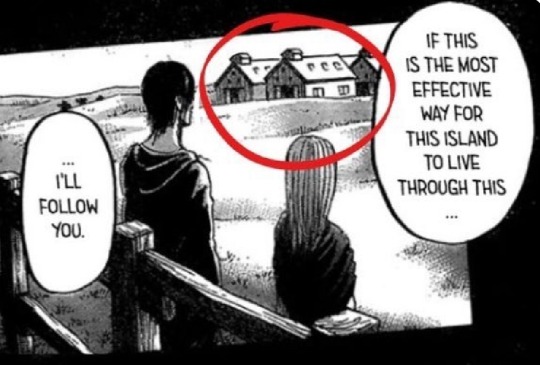
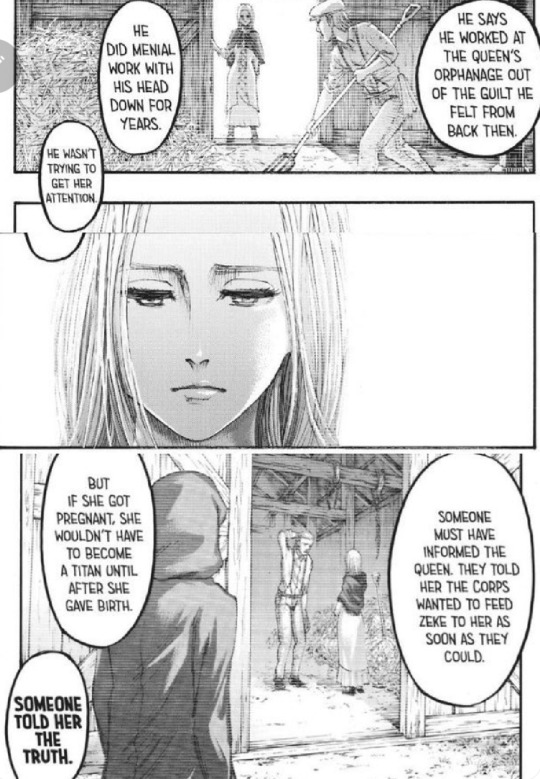
Pregnancy with the farmer, showcases how distraughting her situation is. It is not be romanticized. Her situation is sad and desperate. They are truly talking about eradicting all humans outside paradise. It is a sad and horrible situation as is portrayed by both eren's expression and her's. Right after eren tells her about his plan, she becones distressed and ever since he annouced his plan to her, she has been wearing that gloomy expression.
3. She is faking the pregnancy
I don't think that's plausible. If the pregnancy was fake, firstly when Nile talks about it, historia wouldn't be shown sad in it. According to nile, queen can choose her own partner,so there's no reason for her to look so depressed in his imagination. His words don't correspond with the imagery that's shown. Why does she look depressed then? Because it is actually her real situation. She is truly not okay with this all.
Secondly, if the MP's are planning to feed zeke to her, won't they make sure in ever possible way that she is pregnant or not?
Faking the pregnancy sounds good in theory but it also doesn't serve any purpose. If faking the pregnancy was an actual thing, we could have never been shown historia, not given an explanation on who the father is. Instead we got all of that, what we didn't get is why she got pregnant? This chapter it seems like when eren reminded her of the time she saved him by being the worst girl, she proposes to have a baby. Why did she do it will become obvious when we get her pov.
And isn't this her?
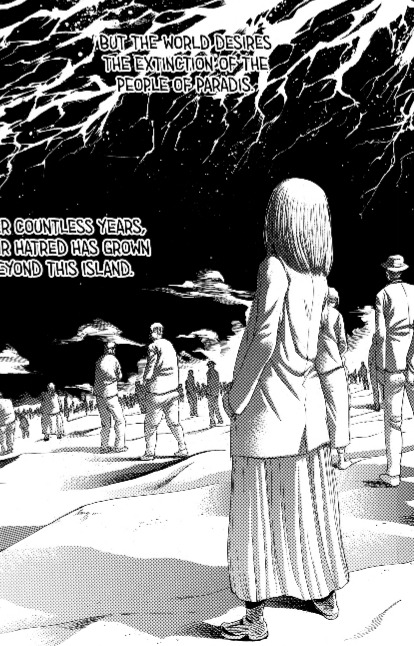
Fake bump again?
Are we talking about snk or a soap opera?
And in snk, everyone is currently distraught and placed in horrifying situations, so why would historia be spared? Why would eren be spared? Mikasa, armin, jean, connie, hange, levi, annie, pieck, reiner, gabi and falco are all suffering. Why would these two be exempt of it?
Why would there be a happy ending for people collaborating on genocide? (Idk what historia's motives are as she did protest aganist the idea, but later dropped the resistance, refused to contact the survey corps or anyone about it just like eren asked? I know there's an explanation for it when we get her pov but I hope it's a good explanation). So, granted the confusion and lack of historia's pov, for now let's consider only eren and floch as supporters of genocide. I will go with my gut and say that she was probably trying to stop eren in her own way, like some plan she had? Clearly and sadly it didn't work.
What kind of message would isayama be sending then? If someone who is commiting genocide gets a happy ending, what would be the message of this story then? He is not just commiting genocide, but along the way hurting people who have always been there for him.
Let's see if official translation changes anything.
Thank you for reading.
Edited: I would also like to add that the odd panel positioning might be isayama being his usual trolling self. For instance, with chapter 112, he introduced the idea of ackerbond and same chapter showed mikasa slamming armin, due to which there was widespread belief that mikasa is not free and indeed eren hates her. (That was partially addressed this chapter. Again not completely, because it has to be left for EM meeting. It has to be handled gradually, because if eren is suddenly and directly shown to feel love for mikasa, it won't feel natural. There has to be some drama and mystery left, otherwise people lose interest).
Mikasa slamming armin on the table was meant to throw us off, it was meant to create confusion. It consolidated the views of people who were already looking a reason to discredit eren and mikasa's bond. Isayama did that on purpose, to throw us for a loop. It had people debating for so long that mikasa really does protect him due to some bond.
We are not supposed to go off based on one cherry-picked moment. We have to go back and see what the character's are about, where they are they headed, how consistent and inconsistent the information is, what the story has told us so far and where it's going..
214 notes
·
View notes
Note
Honestly, like, about the June sillhouette thing. This should have been a sign that either they would have to go without that "genre staple" to respect your story and what it was trying to say, or your stories just weren't compatible at all and crossing them over wouldn't work. But I guess that would require Dogblud giving a single inch of control and we can't have that, can we? For what it's worth, I think your idea is brilliant and it speaks to me as a biracial person!
As pointed out by a friend, Dog would never want to give an ounce of control when it came to her story or ideas because the bottom line is that control is what she wanted. The weird thing was we had spoken in length about how June differed from the other werewolves in our plot and had verbally agreed to it, only to then have her and Ependa come back with that nonsense.
There's a very different way to go about the traditional stylistic way werewolves are drawn in comics and other media, verses how I personally portray June.
This is a style:

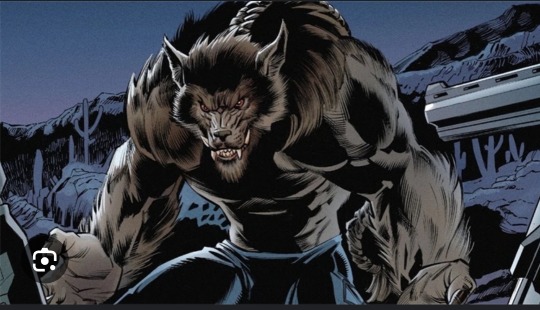

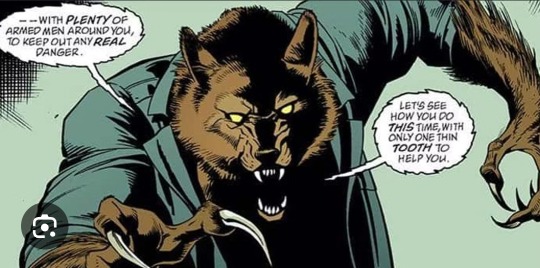
This is a design:



June is consistent throughout her drawings as a Gev Lycan and her design is made with intent. It's based on the traditional comic book style as well as other influences like the Heartless from KH, Were-Fox from Gargoyles, and the brain grain concept from We're Back a Dinosaur's Story. The form was given meaning because I wanted to explain why she had multiple forms (it's related to her mental/emotional state while transformed, as as you can tell she's not doing so hot). I wanted to give the form a narrative meaning to enrich her story so Dog and Ependa implying it was just a stylistic choice and not intentional was rude at best and malicious at worse. They KNEW this was a narrative representation of Black trauma and Dog still chose to argue that it was just a stylistic choice she could copy and imitate.
The bottom line is I was the Art Director for the collaboration (and obvs the Black cultural consultant on the team), and what I said was what had to happen. Drawing the other werewolves like that (none of which were Black to begin with) would have been confusing/inconsistent at best and offensive at worse. Dog refusing to understand that was incredibly frustrating and the more I though about it the more racist it came off to me. Because she knew from the beginning and STILL persisted.
And thank you! I'm biracial as well (and so is June), and when coming up with Strawberry Moon I knew I wanted it to be a uniquely Black story. There's hardly any Black representation in the werewolf genre, let alone anything that has more cultural or historical meaning behind it. I did a lot of research to make it something that could only exist though June's perspective as an older Black queer transwoman, so having Dog try to belittle my work was just disheartening. I opened up a lot to explain June's story to them, and Dog only saw her as an extension of her fetish.
42 notes
·
View notes
Note
From what I've read about the latest Kikai Sentai Zenkaiger special, it's supposedly another one of Shinichiro Shirakura's meta-narratives, assuming he's involved with it as he's the producer of Zenkaiger. Do you have any idea why Shirakira loves doing stuff like this, like with the Taisen movies and Amazons?
From just my long observations on the matter and all of his presented conduct... I believe it to be an “I know what’s best, better than anyone else” attitude that leads him to attacking fans and what people Like INSIDE the stories of the content he produces; generally because what he is behind doing ends up so widely (or in retrospect) Loathed by both his target audience and the various peripheral demographics of these series...not helped by him insisting on doing minor variations on the same damn thing over and over again because Shirakura believes that fans have the memories of Goldfish due to him buying into the “TV shows only have a lifespan of around 150 episodes” Myth. I.E. the 3-conseuctive-years-or-7-western-seasons-year Rule that has long been disproven. No joke on that, he’s cited it on numerous occasions. Even those who claim to like them generally do for either the wrong reasons, in ignorance of what the content was contextually doing, or in hope that the repeat will be better...when it usually ends up worse. Which all is consistent with why the man became a producer in the first place by his own words; he hated what he himself was seeing being made that actually WAS Seeing success, and believed he could do it better. He has not, to the point that literally anyone else using media he’s responsible for has done better with it. Case in point there, how I pointed out how MMPR season 1 lost or ironed out a grand majority of the failings of Zyuranger, (even though by PR standards MMPR season 1 is only not a bad season Solely because no-one state-side had done a show like it before, and every season that aped it in the Samurai-onwards period has done WORSE than it, thus all the legit bad slots have been taken up). It breeds a sense of “he hates what other people liked, so will ruin it to force people to see it like HE DOES”, without any self-awareness that assassinating the characters of others for the glorification of his own characters as we have seen time and again from him...leads people to not turn against the people and stories we liked...but on him and his characters that caused this assassination instead. To use an American media analogy, one of the best Short-term comics storylines was a weekly DC comic book called “52″ (If you’ve watched Linkara’s “Atop the fourth wall” series, you may know where I’m going with this.) the comic line was a spinoff from the event “Infinite Crisis”, filling in a series of events that occurred during a DC-universe-wide Timeskip, that was told from the points of view of minor characters living with the fallout of the IC event. DC Editor-in-chief Dan Didio purportedly hated 52, and in a leadup to DC’s next major event “Final Crisis” commissioned the Event Miniseries “countdown to Final Crisis”, mandated it’s story direction with no understanding of the event it lead into with no collaboration with Final Crisis’ writer (meaning all of its events end up being 100% noncanon to EVERYTHING)...and put a bunch of people who had no reason to be part of writing such an event or utilizing the characters they were TOLD to use even if they were in no way familiar with how they SHOULD act. “Countdown” is what Dan Didio considers to be “52 Done Right”...and it is also widely known as one of the worst Comics series Ever made. Didio never really got over that, thus leading to, when DC Rebooted its canon in the early 2010′s, to use the branding “The NEW 52″, resulting in the moniker being forever tarnished as TN52 stuff is, once more, widely regarded as Garbage. Once more, see your preferred comics youtuber for a larger biopsy on that mess, most of my western comics knowledge has largely come from information Osmosis from Comics youtubers like Linkara and Brian “last angry Geek” Heinz (met both in person several times, they’re very nice), or from my Roommate John who’s a huge comics fan that has recently burned bridges with DC over stuff like “Heroes in Crisis”. But back on point, a lot of this also used in many ways to destroy the old with it’s return/update in favor of The New. You know that Last Jedi “Let the past die, Kill if if you have to” Line that became the byline for the Star Wars Sequels? That seems to be what he does *with Sincerity*, claiming with words to respect the past, but *in his presented actions* not caring how it’s depicted at all because he seems to have no respect for other’s past work (even seemingly ones that would seem like his own in some cases) if it’s for the purpose of glorifying what He himself is responsible for. Case’s in point in that being how Tsukasa was recently Murdered in the rider time specials by being curbstomped by an Ohma Zi-O that by his mere presence Tsukasa should have been Depowering as Tsukasa has the ability to disable ridewatch-derived powers due to his Rider cards, how Zi-O’s head writer flat-out admitted that on Shirakura’s suggestion he only watched the Rider’s film entries to have any knowledge of the franchise depsite continuity in many of them being AU, inconsistent, or not dealing at all with the larger more-focused thrusts of the story that made depiction of most of them wrong and then played writing the rest of...everything by ear and no internal consistency... and going back to the Taisen films...how the awful depiction of the Showa riders actually destroyed their marketability entirely. And I’m not kidding on that, while Showa Rider legend merch wasn’t a great seller, we have hard numbers evidence reported by the Tokusatsu Network that After Kamen Rider Taisen turned them into Villains in it’s story...the entire market for Showa Rider merch Died. It’s why you don’t see any past the Drive Signal bikes, no-one wanted them anymore, Bandai couldn’t get them or most of the Showa Rider lockseeds to sell; there was that steep a dropoff in interest. It’s not helped by who he picks out to do these are generally writers that are not very good on their own or are pliable to the desires of the producer they’re working with. And in Zenkaiger’s case...well, Junko Komura as a head writer has come to have a trackrecord of screwing over characters people otherwise like in favor of those people don’t, which puts her right in his wheelhouse. So yeah, TLDR? HE does it because he thinks his stuff is better, and anyone that disagrees is an enemy of and IN the content he makes.
3 notes
·
View notes
Text
Kipo season 3 finale spoilers
The story and overall ending were great
but... that ending showed disappointing trope use.
Long ramble about redemption vs atonement arcs under the cut
Overall the ending and story was great.
But since I’ve seen so much discussion of it on tumblr, I’m really aware of and disappointed in the fact that the writers went with the Christian cultural “redemption arc” narrative that in order for a bad person to be redeemed, they have to sacrifice themselves for others.
It’s the Christian narrative of “oh this person was a Truly Bad Person and there is no way to change that, so to prove that he did Truly Change he has to die to make up for his sins and then he can be dead and you’re allowed to remember him fondly because he died Pure and Redeemed.
It couples with the fact that they also did the “the bad guy was Truly Evil because we all know that people are either fundamentally Good or fundamentally Evil. And given that the bad guy is Truly Evil, the only way to tie up the story is for them to Die For Their Sins.” Except it’s a children’s show about ethics so they decided to not kill the bad guy..... just send them to living hell. Because that’s better apparently. The ethical choice for people who want to be Not As Bad as the Bad Guy.
And that’s all just disappointing because the whole show was about the fact that people aren’t black and white, either friend or foe.
The show was ABOUT putting the effort in to make connections with adversaries to bring conflict to an end. It was ABOUT the fact that it’s not black and white and you have to accept and work with the fact that everyone is in a grey area in order to move forward.
And yet they didn’t have the creativity or courage to round the story off in any way except the Christian Disney “he died to save the princess, and the evil witch fell to her death as a result of a misstep during the big fight but wasn’t killed directly by the Good Guys because that would tarnish their Purity.”
So onto my specific thoughts about Hugo.
I’m going with the definition of redemption as proving you are a fundamentally good person, usually achieved by dying for the cause,
and atonement is proving you are working on being a better person, by being in a similar position as before, and making a better choice.
(spoiler: imo atonement arcs are better generally, and much more appropriate for the narrative of Kipo)
So with that in mind,
Hugo’s atonement moment was... well ongoing. Because trying to change your ways and live like a better person is an ongoing thing.
But on the boat, at the end, he mind-controlled whatshername, then she got knocked out before he could action it. That was him continuing to go with his old approach, yeah he was now fighting for Kipo, but he was still using his old mindset. Use fear, use force, win because you overpowered others. Then Wolf stopped him and they had their moment, and decided to do it Kipo’s way. Yeah it was Wolf and Greta’s (ah! her name was Greta. Probably.) words, but he was receptive and accepted the principle that his was of force wasn’t the right way forward. The moved forward together in parallel, both giving up the last bits of their old thinking together, and decided to go forward and act like the people they wanted to be, that Kipo showed them how to be. They had already accepted the premise of “bring people together” - they had accepted that goal, but that was the moment they accepted that they needed to change themselves.
(same as how the Atonement Moment for everyone else is when they chose to protect the Mutes from the fireworks - they showed through their actions that they genuinely believed in the project, they weren’t just putting up with co-existence because it was a necessity)
If Wolf didn’t need to die, Hugo didn’t either. There is nothing wrong with having to continue to face the hard task of working to make amends, and facing the reality that not everyone has to forgive you.
(side note - the fact that the coming together to move forward thing also centered forgiveness is also iffy. They didn’t have to forgive the losses they had suffered so recently, they just needed to accept and make peace with the losses in order to move forward. Subtly different thing. Maybe that would be too nuanced to try and cover in the cartoon but still.)
With Emelia...
I’ve said above, that the “don’t kill her, just let her fall to her doom and leave her there” is a Disney style cop out.
But I’m also not entirely against her being marked as unredeemable. She proved that she wasn’t on an atonement path either, at least in that moment - she had the opportunity to not try and kill Kipo but didn’t take it.
And there is an argument to be made that that is perfectly ok from a narrative point of view.
I remember seeing criticisms of My Little Pony: Friendship is Magic because that show’s core message is that is you befriend people they will get better and you can work through it and heal together when you have support, so it is good to try and support people trying to get better, even if it’s hard initially because they hurt you. That is a good message, but is incomplete as a message, because obviously sometimes if you tell kids to just make friends with their bullies, they just end up with more exposure to the bullying. And that is fair criticism (but doesn’t mean the whole show is bad).
So with Kipo, I think that’s a nice parallel to MLP:FiM - make friends, bridge divides, put aside old grievances, collaborate for a future... but sometimes the hateful agitators won’t get better, and the reality is you need to deal with them somehow and minimize the damage they can do.
I liked that they showed that Emelia’s brother grew up with the same pressures as Emelia, but given the opportunity chose not to pursue the bigoted route, whereas Emelia did chose it. It showed that it was all a choice she was making, and what influences she was making them under, as opposed to a magic “Fundamentally Evil Person Who Hates People because she’s Evil”
That was a good choice.
But yeah. Acknowledging that some people just won’t come around from their old ways is one thing.
But why
- say let’s save her from the thing she tried to do to everyone else because “we’re not like her” and “nobody deserves that”
- but then still focus on her deserving “punishment” rather than just trying to prevent her from causing further social harm. Hugo got imprisonment and the time and opportunity for reform and his crime was pretty equal to Emelia’s. Again, very Christian narrative - redemption needs death, evil needs punishment in the eternal psychological torture building.
- and then because it’s “just” the good guys leave her in the Eternal Psychological Torture building. And that is supposed to not reflect badly on them because they aren’t the ones who pushed her in? It could have been a perfectly valid choice, because there was high risk to any rescue party attempted, and when you’re rebuilding a society, you can’t afford that risk. And the fate that she fell into was just a part of the risks of the environment and accepted as a fact of life risk. But choosing not to rescue someone from torture because you literally can’t do it, and shrugging and saying it’s right that someone be tortured, even a bad person isn’t.
In real life maybe that’s different, sometimes you do laugh when a genocidal dictator gets a poetic demise, but this was a children’s show about the ethics of conflict resolution. So, uh, they probably should have come up with something more careful to say than “yeah mostly people need to be met where they are and we all need to forgive old hurts if we want to move forward... but sometimes some people just deserve to be punished and we won’t be conflicted about that inconsistency at all”
All that said
It was a great show
I don’t mind the ending overall - because the issues I have all stick out as “trope usages because they don’t know how else to wrap it up” and thus are easy for me personally to separate from the story’s merits as a whole
#long post#kipo and the age of wonderbeasts#kipo spoilers#my posts#redemption arcs#culturally Christian#darn Jewish tumblr making me aware of these redemption vs atonement things#I love it though - I love the new window to the world
9 notes
·
View notes
Note
I've never seen an episode of supernatural all I see is what's on your blog and each and every day I become more confused about the writing of the show and why people enjoy it :l
okay well first off i am SO sorry you have to see me like this jknbuvgyuhjn i cannot believe im spnblogging in 2020 like im 15 again but things happen i guess.
second of all, the thing to know about supernatural is.... i think, for general audiences, it is an average-to-good show. it's not Bad. It's not Beloved and/or Acclaimed. objectively, i think is also probably the most balanced view of the show and is also probably what the cw and/or people who worked on the show see it as. it lasted 15 years because it consistently pulled in reliable numbers for the cw and grabbed a lot of demographics. like i know the tumblr bubble skews perceptions but, people of all ages, genders, sexualities watched and enjoyed supernatural, yes even to the very end. most people are also not looking at supernatural with the hyperfocused lens that tumblr is and that’s like... okay. those fans aren’t any less relevant or important. if only tumblr was watching supernatural, i promise it would’ve been cancelled like at least 7 years ago.
the spn *fandom* is interesting because like one, no one is watching the same fucking show. like we all watched the same episodes but like this fandom cant even agree on like...basic facets of canon, let alone digging into complex meta. people’s views of characters actions and motivations skew wildly. things one side of the fandom considers nearly canon are like essentially viewed as ooc on other sides of the fandom. you love and hate all the characters and everyone is always about to start swinging on everyone else. you have to simultaneously juggle the ideas that the writers — and for the record this show has had four showrunners and like a billion individual writers who all see and interpret it slightly differently — are brilliant and the writers legitimately are both stupid and bad at their jobs. you have to turn your brain off in terms of continuity because they retcon their own lore every 15 seconds. this isn’t even getting into the ship wars, the boundary crossing, the weird invasiveness , etc., etc., etc. supernatural’s writing is sometimes incredible, sometimes terrible, but generally pretty average, but it had a charm (ESPECIALLY IN SEASONS 1-3) that reeled you in, even if you hated the genre.
when a show is on this long, i think the fans (rightly so) will look back and dig in and get nitpicky on things they wish were covered with more care. things that the show obviously did not decide to write with the intention of addressing/grappling with later on. case in point: dean’s drinking habits. with the exception of like... season 7 where they DO address it, dean drinks a lot as a feature of his character with little to no consequence. he doesn’t get drunk. he’s always driving. it might as well be water. the writers don’t intend for that to be more than just a facet of what makes him a rough and tough action hero even though logically, he should be drunk all the time. even w/ interviews w/ the cast/crew, it’s clear the writers don’t think the fans will care and/or notice a lot of things. they do, because well, they’re invested. the fandom extrapolates because that’s what fandom does, but i really don’t think the writers connect those dots because dean’s drinking /isn’t/ a problem until they need it to be. because spn has gone on so long, it has more instances of things like this than other shows, and our cultural contexts have also evolved a lot along the way from 2005 to 2020. so again, there’s a lot to work with. i don’t really think that’s so much a reflection of the quality of the show than it is a reflection of how long it’s been on and the way society has changed since then. dean not knowing what myspace is is funny for two completely different reasons in 2005 and in 2020, for example.
my own personal opinion is, there’s a lot to enjoy about supernatural. seasons 1-5 are legitimately good tv. for all their flaws, they have a very clear aesthetic and tell a story that is well-structured and relatively coherent in terms of themes and continuity. they set up complex characters and relationships and everyone’s motivations make sense and that arc wraps on a tragic but ultimately narratively consistent and thus fulfilling point. of course, there’s stuff i personally like and dislike but separating my emotions from it, it’s very good. i think if anything, i would recommend anyone watch those five seasons and then decide whether they want to continue or not. if you don’t, you’ll end on a note that feels complete. it’s what i’m doing w/ my friend elaine, currently, actually. if she decides she wants to continue after 5, we’ll do that, but for now we’re just vibing in season 1. after that point, i think if you decide you care enough about the characters to push through wildly inconsistent writing, there’s stuff to enjoy in seasons 6-15, but the quality and particularly the consistency dips and this is also where the retconning really starts to...intensify. it’s also where the mythos of supernatural grows bigger than the show itself, which i think was always supernatural’s downfall. the crew started caring more about the whims of the fandom and frankly the fandom became more of the story than the show, and that’s how you get people piecing together what supernatural is based on out of context gifsets that skew perceptions wildly and get Supernatural Fandom™ which... frankly, in my opinion, changed fandom culture as a whole for the worse, like yes it’s a huge, powerful and often memeable behemoth but also... the way it changed creator-fan interactions is something we’re going to be unpacking for a long time. i think had the writers tuned out fandom wars and internet yelling and strived to tell a story that made sense and was well constructed to /them/, we wouldn’t be here and seasons 6-15 could’ve found a way to be as beloved as the first third of the show. i’m personally of the opinion that being a fan of something, for better or for worse, does not entitle you to part of it’s creative process. it doesn’t become a collaboration, and the door is always there if you get to the point where you want to leave. i think supernatural getting too caught up in its own fandom and balancing all these conflicting interests is ultimately what made the last 10 seasons, and particularly the back third of the show oftentimes flounder. the finale chaos, in my opinion, happened because they tried to please everyone by keeping too many things vague so people would have room to play in their own sandboxes and round out the story the way they wanted to see it and thus ultimately, a lot of things were left in the air and so for many people, the closure they were hoping for just wasn’t there.
i dont know how this became a long and scattered collection of thoughts but tldr, people enjoy supernatural because at the end of the day, it’s an enjoyable show and i think the more you stew in a fandom bubble, there’s more to get worked up about. which is fine. i like that fandom engages in complex conversations that the show won’t grapple with, but that’s not for everyone and i don’t think the fact that we have these conversations is necessarily an indictment of the show’s overall quality.
#asks#spn#long post#**#Anonymous#for the record#i liked the finale and i watched the show for 10 years of my life on and off because sam and dean winchester are two of the most interestin#interesting* characters and also have the most interesting dynamic i've ever see#seen*
4 notes
·
View notes
Text
Acknowledgment of Contradiction And The Use of Character Foils - The Eighth Genius
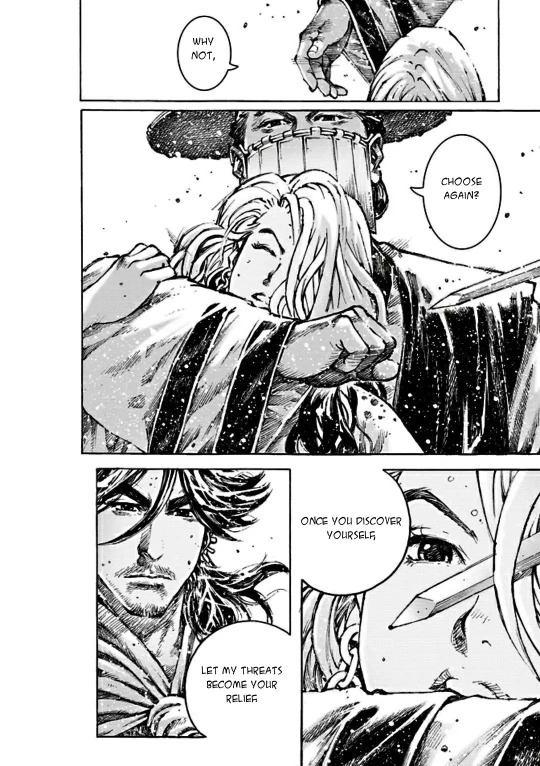
Note: that this analysis will also involve speculations to nail the point that it is centered on the character introduction and that this analysis also includes the opinions of not only me but other members of the community as well.
The first things first, let’s start with the definition of the terms that will be a subject matter in this text.
By nature, contradictions are the details that by themselves prove the wrong of a system that they inhabit, thus efforts are made to avoid them like a plague, as it is strongly believed that any combination of statements, ideas or features will crumble if it consists the inconsistent details – it is considered as an antonym of “confirmation” for a reason. They also tend to make perfect counter-arguments.
Ravages of Time argues that not only everything is consistent, but also from the point of view of the ones that are trying to assert the ideas, said ideas can be built on contradictions, can consist of contradictions, and said contradictions could be used to secure the system. It is still better to hide that fact from the masses to avoid the confusion
(Strangely enough, inconsistencies within the writing of RoT actually enhance its consistency)
A foil of a character, on the other hand, is a tool of the story-telling. It is certainly similar to the “contrast” in artworks, as it is supposed to highlight character trait by placing it near the opposite character train – common usage is the calm and pragmatic sidekick next to the hotheaded protagonist.
In idea, every character can foil any character in the story, so the key part of foiling is the interactions of the concrete personalities. In this analysis, I will explain as to how Ravages’ manages to connect the threads indirectly, through the organic mirroring of the circumstances and affiliations.
Let’s get started.
From the perspective of the governorship or leadership in general, “contradiction” and it’s acknowledgment was always one of the fundamental parts of The Ravages of Time – be it either Cao Cao’s campaign with the image of corruption, which was motivated by greed, for the greater good or selfless selfishness of Sun clan that was aimed at the fundament of the corruption that is the Han dynasty (ironically, against their contradictions) or Liu Bei’s fake image of a saint or even assassin Liu Da who seeks the comforting life through the court by going against himself to the point of forgetting it – everything is chained to the rulership, because that’s exactly what affects everything else.
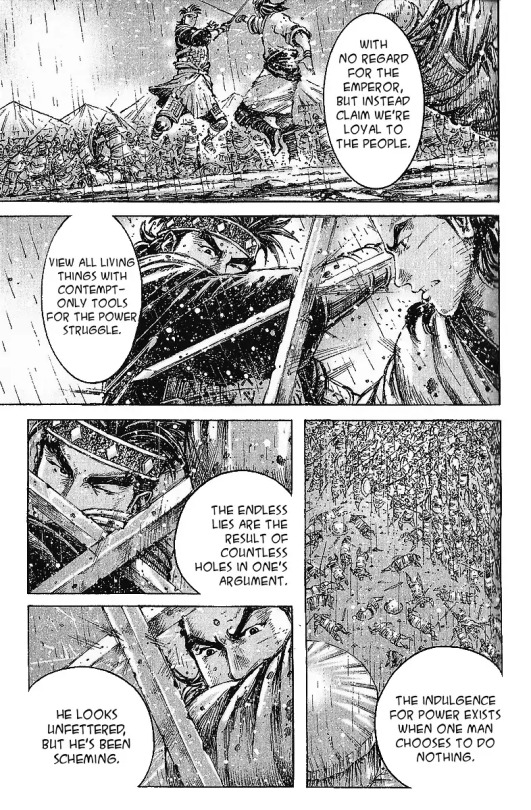
Full embracement of this exact idea – considering how coherent and varied it is with many sides, even when it comes to religion and politicians *cough* LOGH *cough* – is what allowed RoT to stand out among any other war and political drama. And despite the dense story-telling that spans more than 500 chapters, its brilliance is still being polished by not only showcasing the usefulness of this theme, but also the criticism through its shortcoming, which results in the cycle of never-endlessness (and, arguably, the placement of RoT above any competitor, but that’s but a mere meta-talk):
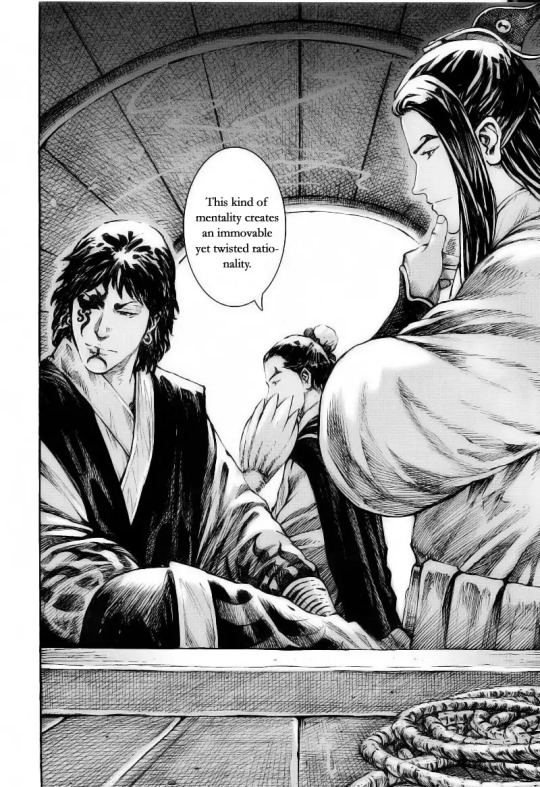
there's the floating text in 372 that appears to praise the down-to-earth approach (associated with Guo Jia) of seeing humans as being more crow-like (with its positive and negative connotations, both nurturing toward their own and vicious toward targets) rather than dragon-like (with associated images of nobility and grandeur), offering the suggestion that perhaps the thing about humans is that they aspire so much (and as it's insinuated, cause so much trouble in the process) without realizing their station and limits and how such ambition and greed are nonetheless part of how they are in the world
now it's not made completely clear how this monologue is connected to Guo Jia's stances, but perhaps one way to establish the link would be to assume that if Guo Jia doesn't have a lofty view of humans, he could embrace the path of ruthlessly carrying out the reforms one insists on (never mind if others accept them or see them as virtuous), hoping for the best that perhaps at the end of the day things could work out (and someone could pick up the pieces the morning after once he's gone and this is where Xun Yu is supposed to come in, the comfort after the chaos)
what Zhuge Liang takes exception to is the notion that the comparison of humans to crows (even if it's a useful corrective to the boastful comparison of humans to dragons) somehow justifies the brutality of the process of pacification... thus the counter retort that people are people, crows are crows (of course this too assumes that Zhuge Liang knows better about what it means to be human)
and this brings us to the 'immovable and twisted rationality' that Zhuge Liang decries (even if he concedes that some sort of peace that is to say the peace of a pacified population desperate for anyone to impose clear order and guarantee safety can be founded on ruthless subjugation as historically attested in the rise of empires and regimes)
Guo Jia (and by extension, Jia Xu and Sima Yi and others like them) wouldn't mind exploiting and perpetuating that rationality so long as there is a convenient path to quelling the unrest (which they see partly as a result of greed and ambition that form part of the human condition) and putting in place some sort of reform to help manage the chaos
on the other hand, Zhuge Liang still believes that humans can be guided and governed by virtue, that loyalty discourse can be used not simply as a cynical method to prop up the ruling order, but as a moral principle that prevents needless bloodshed (yet he finds himself in the compromised position of having to wage bloody crusades but under a righteous banner)
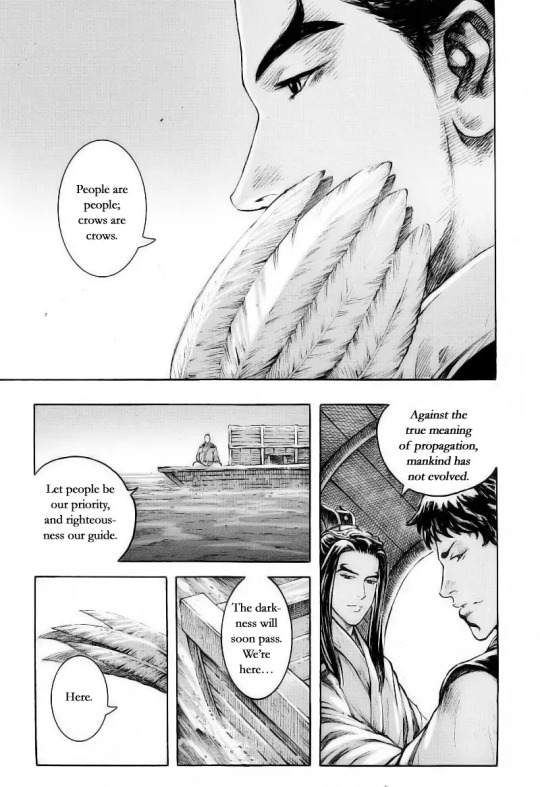
This basically serves as a set-up to what will RoT shift into and who will be the main actor of the following arc. So, in the same way as Zhuge serving as a foil to Guo Jia, the Eighth Genius is being introduced in his arc and the Eighth will even get focused in the following arc. In the Red Cliff arc Eighth did exactly what Zhuge was doing prior to active participation – judging the conflict and “reporting the weather” – and yet he fails to predict the seventh (well, at least, he waited longer). This dynamic will be further established at the end of the Four Commanderies arc and as of now, we need to completely dissect 8th’s introduction, to have a deeper understanding of what will their discord stand for. All in all, each and every sentence uttered by his mouth is quite worth the attention.
at this point, Zhuge Liang outweighs the 8th in terms of reputation and narrative placement (not to mention that throughout the series, Zhuge Liang has been the one guy most in touch with the rest of his classmates on the sidelines and the one guy the other classmates either admire or dread or want to compete against), though the 8th's status as a shadow counterpart to Liaoyuan Huo (because of the Zhao Yun angle) makes him parallel Zhuge Liang (who in turn serves as the mirror collaborator/nemesis to Sima Yi) in one respect in that both have strange ties to the eponymous duo of Ravages
in addition, the 8th parallels Sima Min (in being the last and shadiest on the list of 8 illustrious names) and possibly the 8th eccentric (assuming this member shows up and fits the pattern), and in terms of outlook he can be compared to Yuan Fang
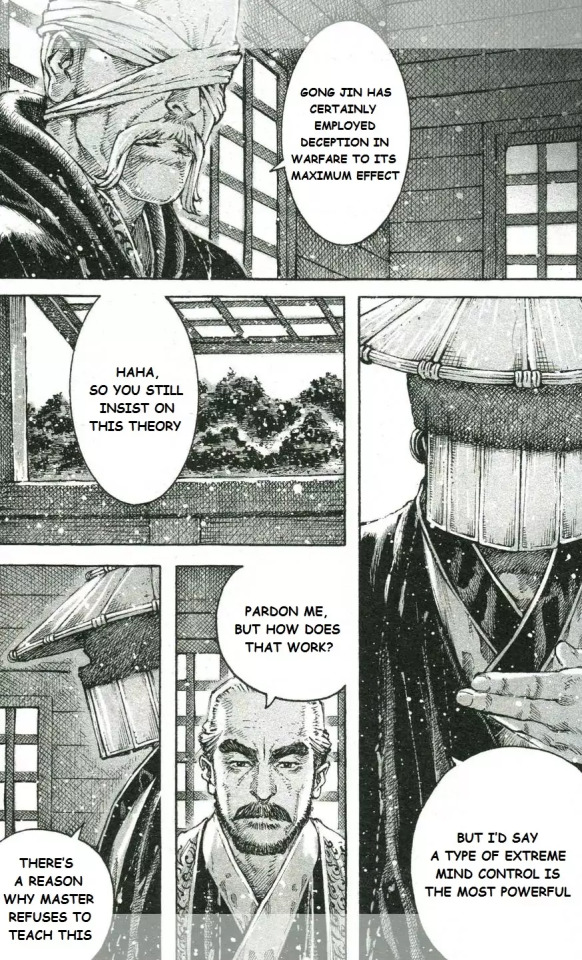
Another thing that we need to pay attention to in the Red Cliff arc, though, is Eighth’s interest in mind control (as we know, character introductions In RoT reveal a lot about the characters) – as Water Mirror says, to subdue the enemy without a fight is the strongest method of war, but the eighth insists that the method, that the evil cultists are so infamous for, is actually the most productive one (probably because avoiding the war merely keeps the people safe, but is not satisfying – it is not doing anything to enhance the condition of them, as it won’t save people from themselves), but even if one won’t give in to the temptation and derail from the bright path, these techniques are leaving everlasting negative effects on person’s mind.
So, if we were to speculate, the most likely theory is that the Eighth learned said methods, which ties to another theory of him being the renowned scholar named Zhang Song (that being said, I'd rather see Zhang Song as another character altogether (whether the 8th takes that alias later on or just cooperates with him/them since I'd rather see duplicated names than merged characters)), but let’s talk about later on.
But… why and when did he betray the expectations of his teacher? The first one is rather easy to guess. It is about his ideology of individualism – instead of waging meaningless wars with tons of unrecorded blood being spilled, which would also limit everyone else’s desires and freedom (represented by Fang-er), that comes from the natural craving to the anarchy of human nature, whenever it is caged in order, why not exploit and weaponized and control vices and viciousness of a person? Instead of forming a collective mindset, why not try to understand the mind of every single individual? Instead of relying on brainwashing through moral propaganda, why not have faith in inherent human selfishness?
Him being an assassin resonates to this idea very well, because he is doing everything on his own and is not commanding a mere group, collection of people. He is doing things alongside them, understands them, and is, in fact, closer to reality than other classmates. Sure, Zhuge, too, understands the nature of his surroundings, but he is still a man of principles and his viewpoint is stuck on that – growing colder to actually personal human interactions and yet he is the one who values a human life the most (this mirror’s to 8th’s apathy, despite him acknowledging the personal desires in an individual)
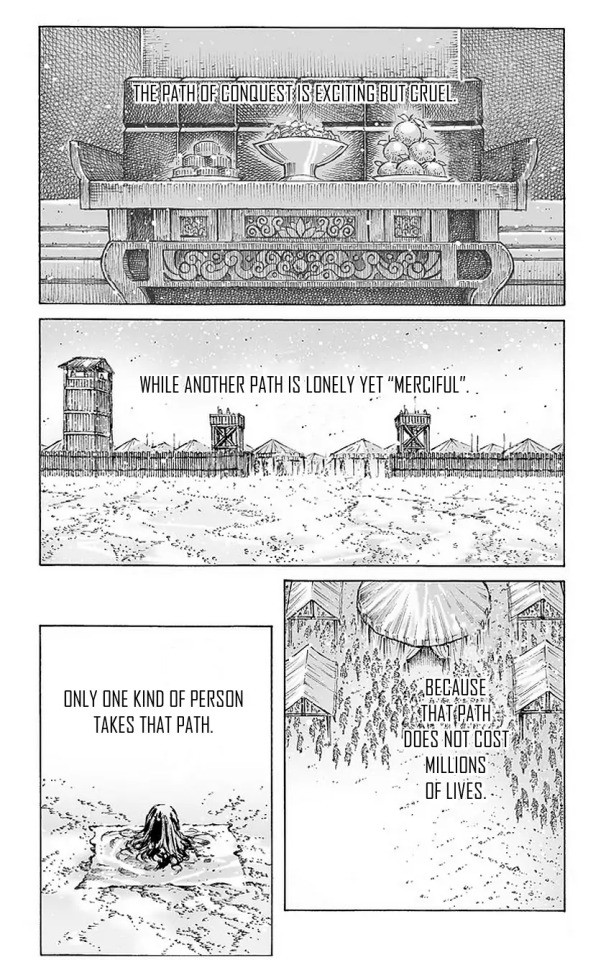
To be fair, he is more of an assassin than any other character with the same profession in this story, because he actually lacks identity as nobody knows who he is if he won’t reveal everything by himself and, funnily enough, he is free to hide his identity even if he were to choose a warlord (also, he does not really HAVE TO be devoted to any of them and choose as many he wants to choose for the sake of his plans, which would mirror 7th’s “devotion until death”) and he could attach to himself whichever identity he wishes. Lack of identity was fatal in the hands of Sun clan and lethal in the hands of Sima Yi, whereas they still had some kind of connections, so now imagine how peculiarly promising is 8th’s potential, who does not seem to have any attachments.

I may as well rightfully declare that his lack of identity has a gargantuan perk to counter the cynicism of history – Whatever he does will be judged by future generation’s own assessments, yes, but if 8th’s real identity remains unknown, no one will know to whom they are supposed to connect all of his actions that he committed with the identity of others, hence the perpetual inaccuracy of historical records. Akin to Yuan Fang, who is an original character of Ravages of Time (the difference being, that if Yuan Fang has an original identity, 8th can “grab” identities of actual historical figures and get away with it)
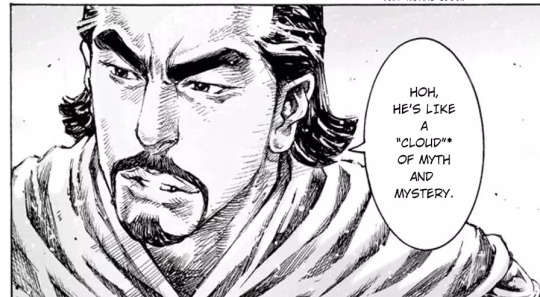
As the last student, of course, the similarity with the first student Yuan Fang (well, his “lord” was chosen instead of him, by being a son of Yuan Shao – that selfish romantic really had no chance to CHOOSE to live for himself with his loved one, huh?) is apparent. Aside of the fact that Fang was connected to the cultist, he was also trying to practice the art of survival, (which he did not manage to perfect, thanks to his daddy) and even being able to kill people by his own hands (as much of a prodigy as he is). But ironically, (which can also be considered as a contradiction) the simplest desires are the root for the grandest ambitions and at the end of the day, Fang proves this point of 8th that self-serving desires may even seduce someone to achieve grand visions, he is delving into the corruption, rather than taking care of “his” people individually. And, after all, 8th does not really resemble to romantics.
Well, it won’t be fair if I do not mention that Zhuge (by torturing people) and Zhou Yu (by being a sparring partner of Sun Ce)… and even Xun Yu (by slapping a wolfneck)… are more than capable of doing some things by their own hands.
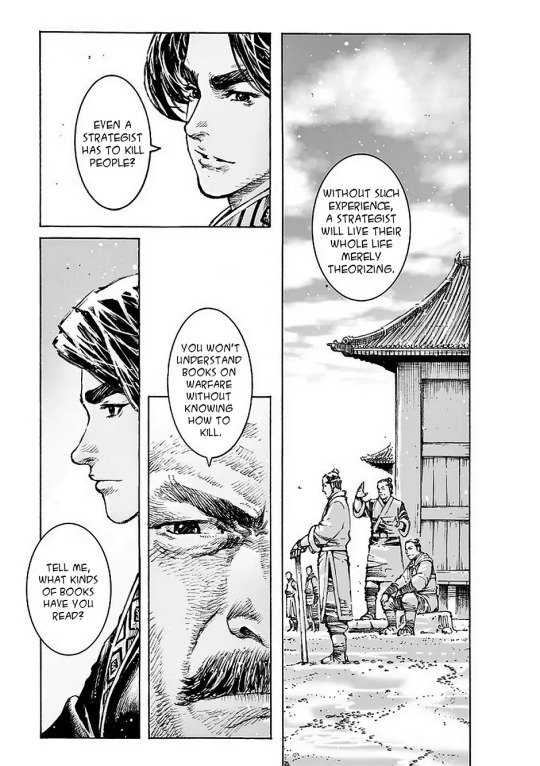
So far we can feel free to say, that 8th is not being seduced by desires (take a shot every time the eighth contradicts himself and yet never stops making sense) and he is a quite unemotional human being, considering that after the death of his oath brother he did not really look affected, remained perfectly calm and rational – basically took a duel out of respect and Yun’s lack of stamina. You could argue that he had his mask on, so it would have been hard to notice his emotions, but he instantly gave orders of retreat after the death of “the lord” and it was also implied that he does not really connect well with others.
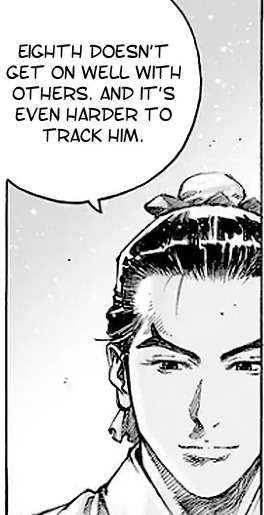
He wears the mask of a caring person, while Yun wears a mask of an uncaring person.
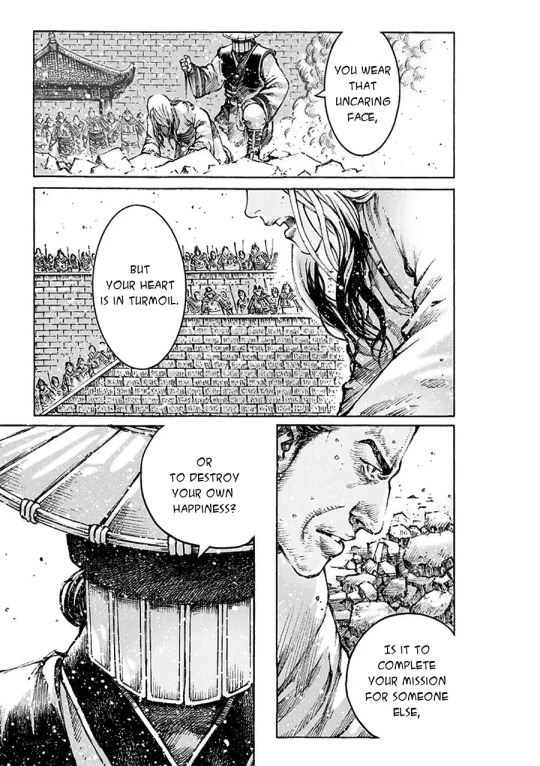
(Honorable mention of his ability to rapidly adapt to the situation – which should be coming naturally to a person who is a good judge of double meanings (pointed out by his hand signal first and then by “he discovered the secret of various books in the world”)
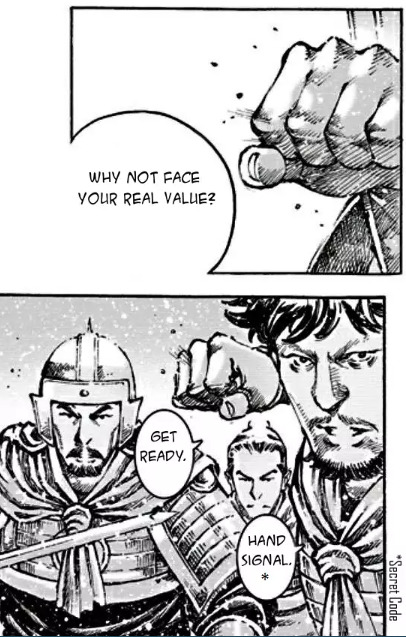
It is quite fascinating to see such a person to be aware of everything and be appealing. In some mediocre stories, he would have been extremely childish and overdramatized at it, lacking any kind of human decency. On the contrary, 8th respects his enemies, is quite affable, acknowledges the contradictions within the human nature and acts according to it, and does good deeds for others (“repair your shed”), even if not unconditionally – as he is a morally grey character, and not ham-fisted at that.
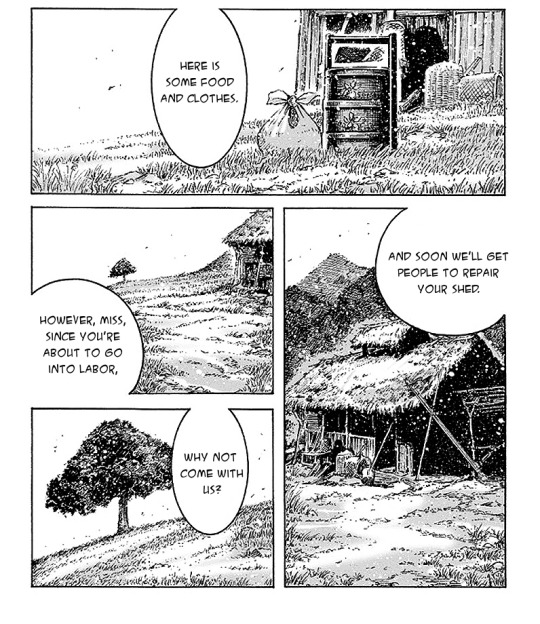
This brings us to another philosophical part of his views – the value. “Feel helpless all you want, it won’t do anything for you”, every individual has their own, but to attain said value they first need to realize what their defining uniqueness is by themselves, instead of relying on either someone else or heavens and then act on it, make use of it. They must make a choice whether they will be “childbearing” tools or… weapons. To me his reaction (or lack of thereof) to this line of his oath brother “undertake its duties when called to the office; retire otherwise” felt like he (oath brother) completely lost the value in his (8th) eyes, by not only being enslaved to the whore for naught all these years, but also clinging to the brother (when he could have just let the woman infiltrate Shu). This page here can also be easily interpreted as if someone should trade their own valuable people, but it can also mean that people should see the value in whatever they have, whether they be items or loved ones, and cherish them.
So, in short, you do not need to imagine yourself (self-delusion) as a god-emperor to give yourself the value and be content to live.
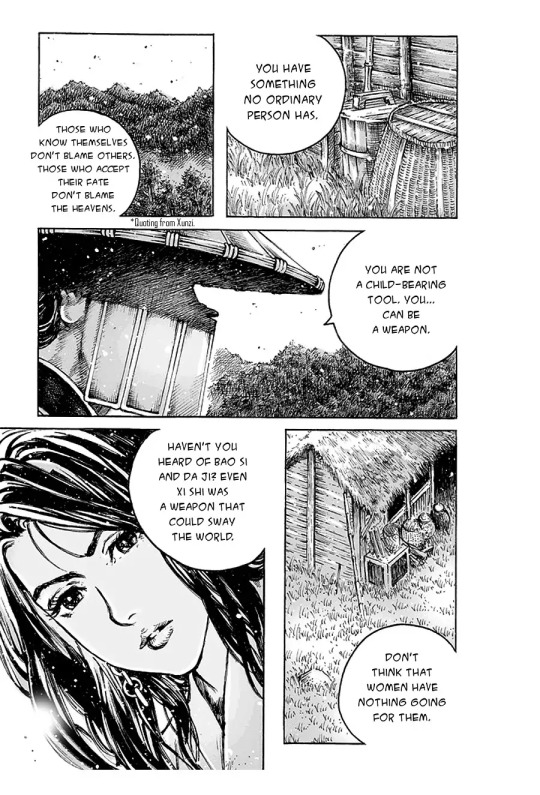
Above we discussed how 8th is encouraging and guiding others towards seeking the value in themselves, but that is not quite all, is it now. Sure, you find value in yourself and the people around you, but the said value needs to be defined by something. To apply 8th’s standards, the more benefit is from someone, the more is his or her value. And even if she was merely being traded for a lovesick man, she still had some value in her.
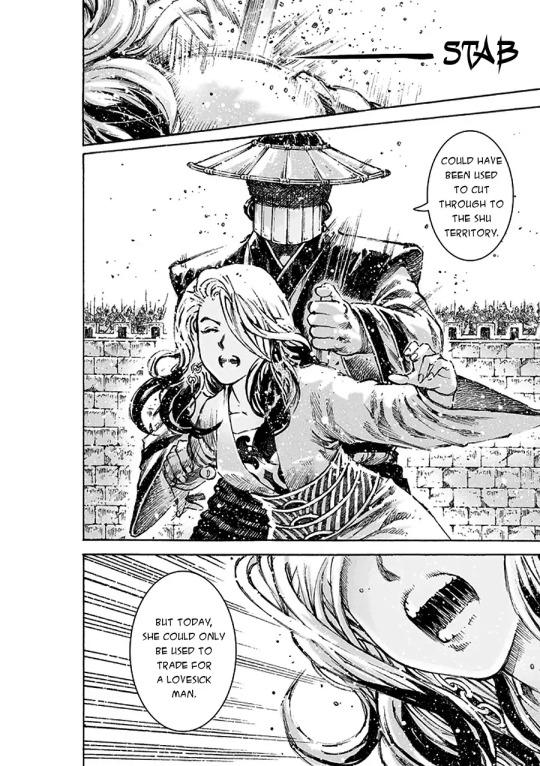
He is acting as if he does not view people as objects, Yun is acting as if he does not view her as a loved one (material value against the emotional value)
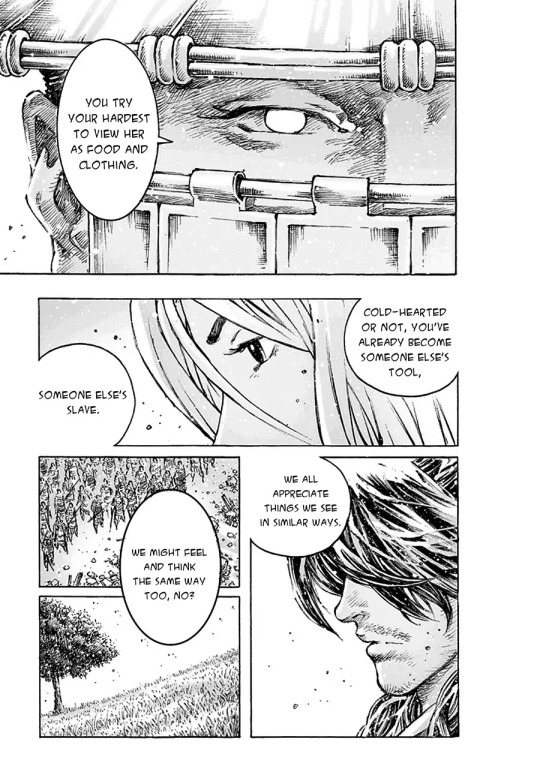
Infiltration of Shu is quite obvious with all of these details and that freely be interpreted as if 8th is focused on Shu, but we could also take it as a hint that he has tried and may still be trying to plant some moles in other factions as well.
In addition, he usually talks whatever is necessary without much care to his actual intent, which not only results in an interest rabbit hole but is also a very intriguing character trait and a means of manipulation. Reason for that being the fact, that most of what he is saying is actually… true. Yes, his words are self-serving. Yes, his words do not reveal what his actual motives are. Yes, he is purposely aiming at your most vulnerable topic. But he is the only one telling you the truth about yourself and he is the only one giving you the freedom of choice towards what you crave.
The beauty of the 8th Genius' dialogue with Zhao Yun to me is that, despite all of his words being self-serving, they were probably the most honest words Zhao Yun had ever heard. Even Liu Bei or Sima Yi never mention the fact that Zhao Yun has essentially been a slave all these years, who has given up on his happiness to fulfill the wishes of others. And yet here comes this unknown man who manages to get to the very depth of Zhao Yun's character in a mere couple words. And to make it even more beautiful, Zhao Yun faces these words that cut him to the core head-on, and not only acknowledges them but in the face of these truths and in the face of a final chance at his own happiness, he chooses again to remain a slave for the sake of someone else's desires. And that's what makes the 8th Genius so enticing to me. If he can get to the bottom of such an enigmatic character like Zhao Yun in his very first appearance, I can only imagine what he'll do later on.
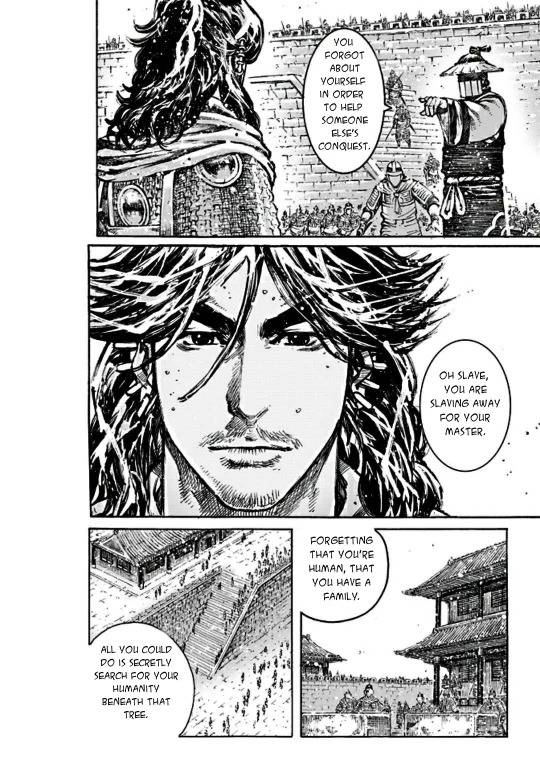
Though I have to note that the 8th isn't the only one to have confronted Liaoyuan Huo with a dilemma... Zhang Lei sort of did that in 293, Liu Da offered something similar in 384 (the difference I suppose is that whereas they challenged Huo to choose between 2 masters, the offer of the 8th, even though less genuine, is for Huo to choose between serving a master or walking away)
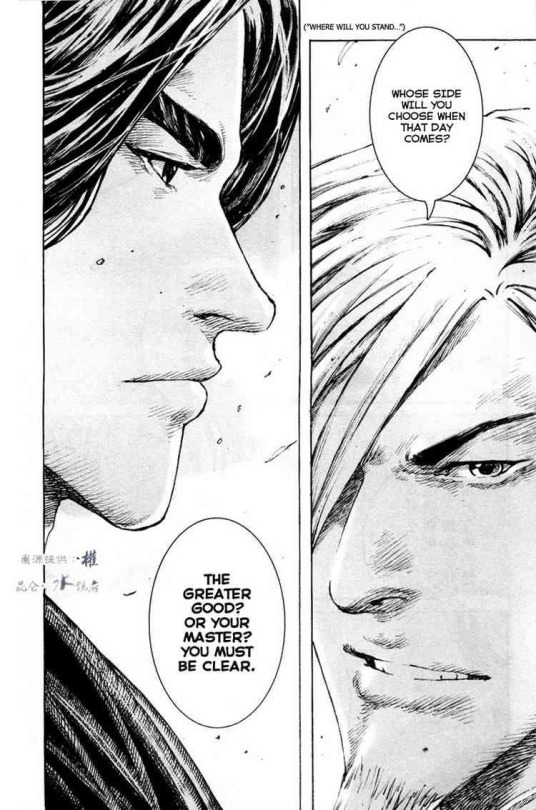
in another note, it's important to stress that if warmongering is the problem (especially if we consider that what usually happens when regimes wage war as a distinct form of mass conflict unlike popular uprisings and insurgencies is that pacified populations are coerced or cajoled into expending their labor and lives to feed machines of organized violence that mainly benefit a select few) it's not a matter of who wins or loses since the game itself is rotten regardless of goals and intentions
Alas, one other issue is that many cut ambitious conquerors (especially if they exhibit charisma and are on the winning side) some slack, while those motivated by ideology or principle (especially if they're losing) are selectively denounced as zealots for trying to push a program
And yet who doesn't like heroic tales…

That’s how the 8th stands out among his classmates mainly in terms of how his rhetoric focuses not so much on principles and ambitions (even Zhou Yu's attachment to the Sun clan involves sticking by some notion of continuity), but simple and personal desires and choices – which fits the narrative of the Four Commanderies and analogically makes it stand out among the other arcs. It is an arc, which highlights the how empty is the shell of people, who are getting defiled by their own egos or thorny roses, beneath the surface of their facade and how some of them stop, start listening to the voice of reason and thus develop into respectable men while maintaining their individuality. The unconventional part that elevates this arc into being a masterpiece is the fact that even protagonists may have a facade and in overall, not every facade is shallow or/and they do not serve solely the corruption.
Sure, I talk a lot about the comparison with Zhuge, but these details were brought from this exact arc that is not even focused Zhuge, but aside of masterfully crafted indirect hints, Four Commanderies put on a table way more than just that. The obvious one being the personal conflict with Zhao Yun, which I already mentioned:
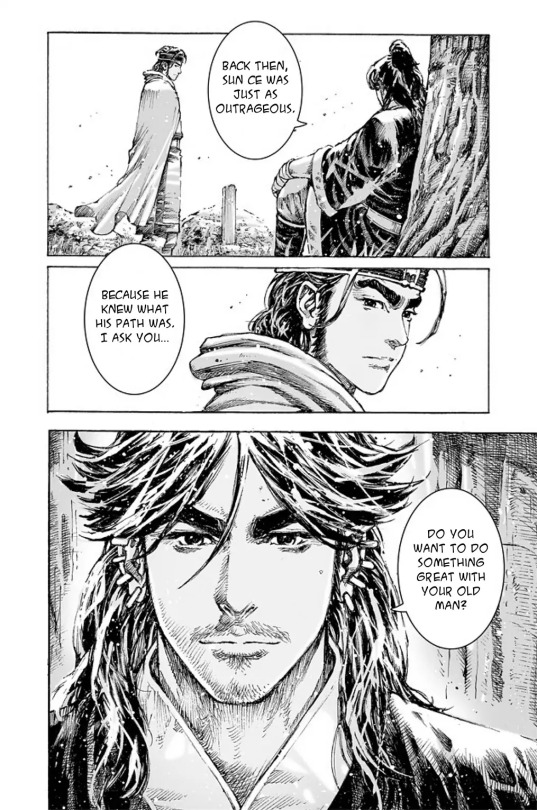
There 8th “asked” Yun to choose what’s his actual happiness, his own life or someone else’s path (that is burdened with failure) – little did 8th know that from Yun’s perspective it did not really matter what he would have chosen, because of how both of these choices are important for Yun as a person, how both of them are what he is craving for and how both of them are going to enslave. And he can’t even choose to not choose, because he would be going against himself in ANY case. As cold-blooded as he is, Zhao Yun got numb by making the best possible choice – “Three days. More than enough”. Truly, 8th failed at psychological warfare (and even if had an upper-hand in a duel, it did not really matter), but admitted that Yun made a right choice, without explaining himself – I think the existence of Zhao Tong made the choice correct. When a father and a son met, both of them found their “pieces of jade ornament that can be traded for cities” (note how Yun compared his son to Sun Ce – that was rather delightful for Tong, considering that no one was taking him seriously whenever he was comparing himself to Sun Ce). That was quite well symbolized by the lively tree near Yun. Usually, whenever a life-changing event happens in his life, he is near a dead tree.

After all, Zhao Yun is already used to selling.

So many lives that he cared about are no more, what’s one more.
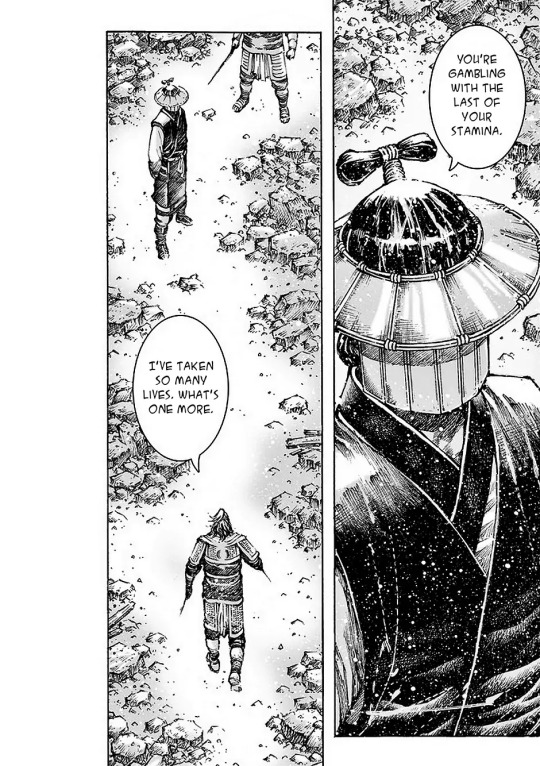
(And if I were to fanboy over him more – “Huo” did not really return after the warrior’s duel (named as “a path of no return”))
Briefly to come back to Zhuge, the one who basically pulls some strings behind Yun – when 8th mentioned the facade of the “greater good”, I was suddenly reminded of a saying by melancholy 7th about “benevolent realists” when he was talking about how people like to shield themselves with “FOR THE GREATER GOOD”, while in actuality they are masked egomaniacs. But if Zhuge says that people use “greater good” as a mere excuse (as he always dislikes the certain type of people), 8th remarks that these self-proclaimed paragons of virtue (such as 7th) are merely deluding themselves and the concept of “greater good” does not even exist.
In short, lying to others that you are a savior vs. lying to yourself that you are a savior

If you think that the introduction of this character is already great enough, you need to get prepared, because the revelation, that completely recontextualizes these events into something even more meaningful and profound, is yet to come.
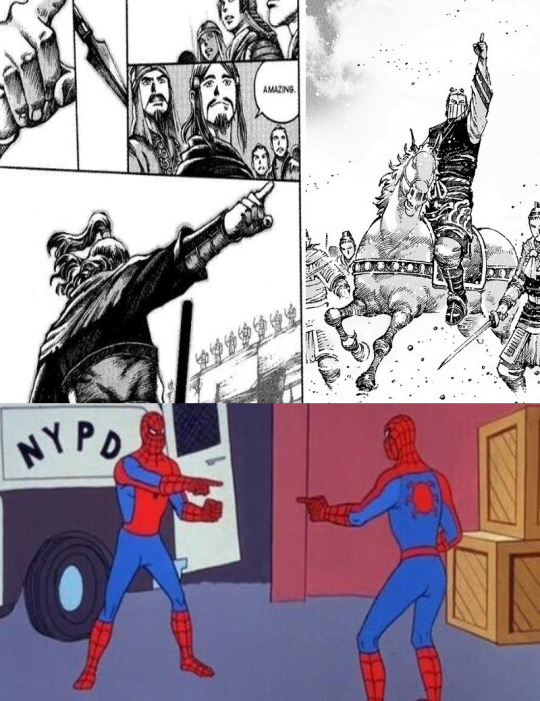
When Yun remembered the bits of 8th’s backstory from his memory, 8th pointed his finger to the sky, a call-back to that scene when Huo was named as Zhao Yun and that, as far as we know, cemented him as the perfect foil to Zhao Yun and now demands from us to re-analyze this precious arc of his as the mirrored life of Liaoyuan Huo from two respective points of view. Considering the fact that Ravages of Time is exploring the history and human condition as a theme, then it won’t really be a surprise if I would define “mirrored life” as if they were the alternative versions of how would Huo’s life continue if he were to choose different paths of life.
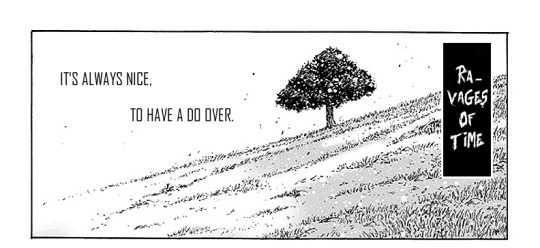
1) Zhao Fan’s case is rather easy to elaborate on. He represents the “pretentiousness” (by compensating his lack of masculinity and love from his loved one, through the pretense of just babbling hollow words (merely citing others), as he is not capable of doing anything else) against the “reality” of Zhao Yun (less talk, more action attitude of his and plus the playfulness that is hiding the coldblooded nature beneath the surface).
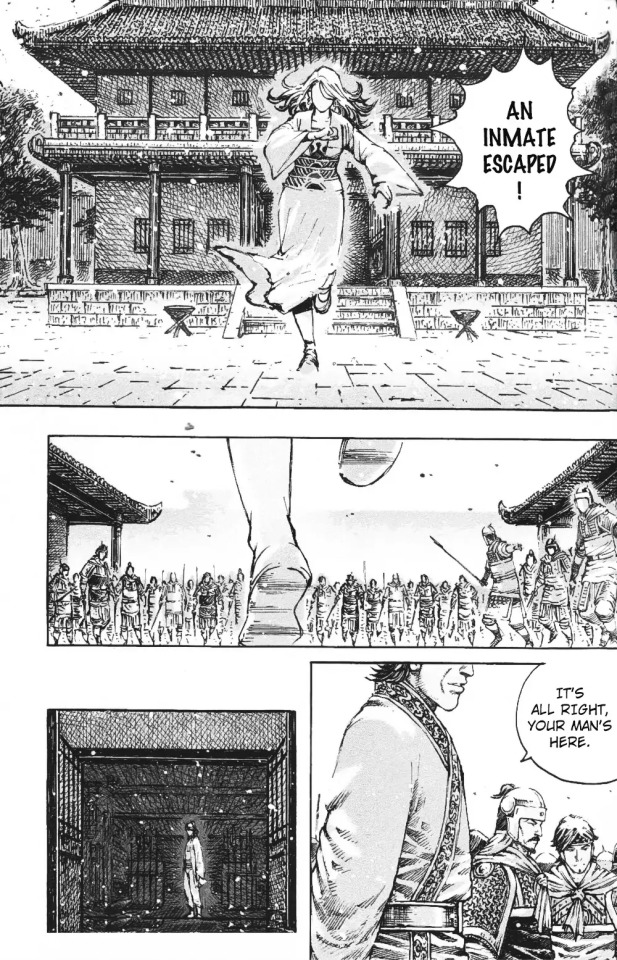
That pretentiousness would define Zhao Yun as well if he was not so hardened by the high amount of struggle he lived through and later be polished by Liu Bei. Huo would have been in his place if he were to come to his loved one instead of Xiao Meng. But that would come with its own negative consequence, as he would not have been loved.
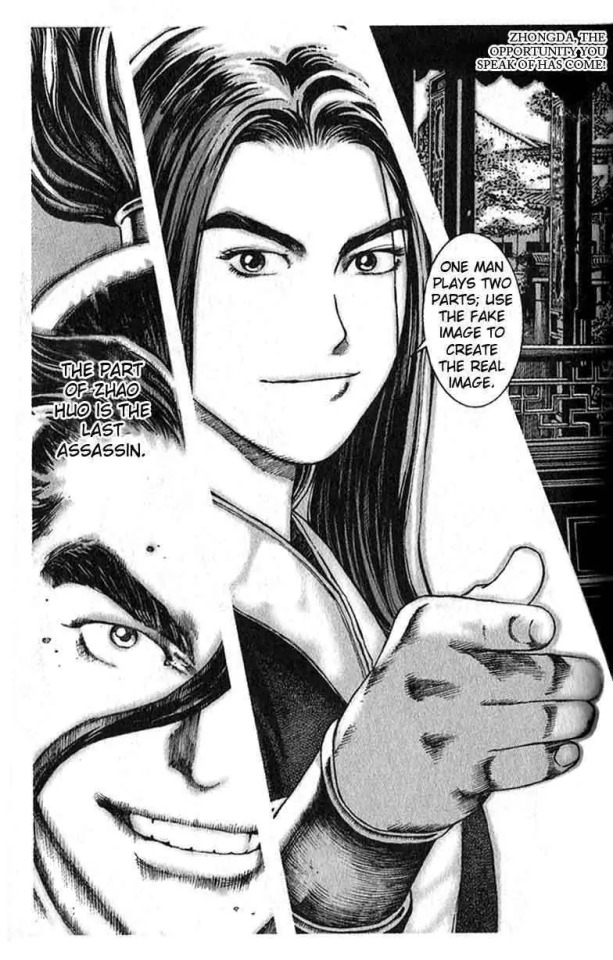
2) 8th’s case is a bit complicated. They do share the path, but with the polar opposite approach. “Sharing the path” is amusing on its own right, though. Huo took the name “Zhao Yun” and will get recorded in history with someone else’s name, but the guy who was born with the name “Zhao Yun” won’t be recorded in history with his own name as well. Still, his name will exist in history, but it is going to be a guy, who’s completely different from the original Zhao Yun. Talk about an identity crisis.
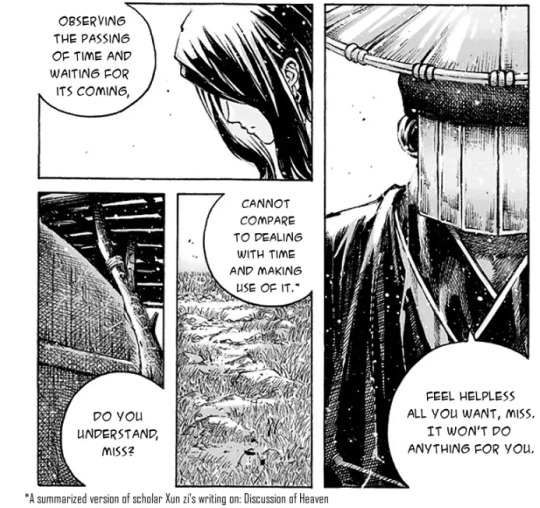
“observing the passing of time and waiting for its coming, cannot compare to dealing with time and making use of it” – This throws us back in time, as far as the early chapters go, when Yun had an internal monologue about waiting for someone who would change and save the world. Around that time, 8th was persuading Huo’s loved one about how meaningless it is to just wait for something. Perhaps Huo would have undergone 8th’s path if he were to study as a genius to save the world instead of waiting for someone else to do it, but at the end of the day, he managed to understand where he belongs to.
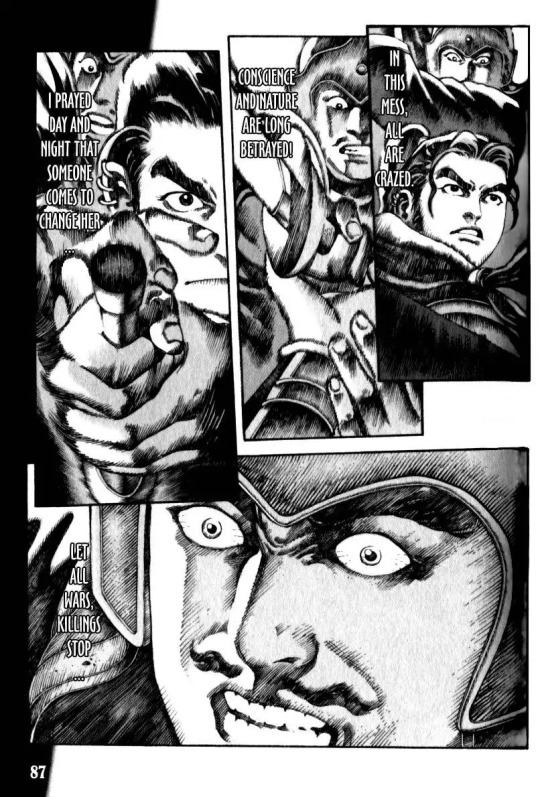
Huo was waiting because he did not see himself as someone who could really make a difference in the world (“if martial arts would have made a difference, then the key positions in the world would already be dominated by various schools”). Meaning, that only “grander” things affect the world (such as Jesus and Dragon). but 8th begs to differ, with an argument that the delusions of grandeur should be broken for people and that even “books”, as tiny as they are, can affect the masses (for example, how Sun clan was hiding the true Art of War for themselves)
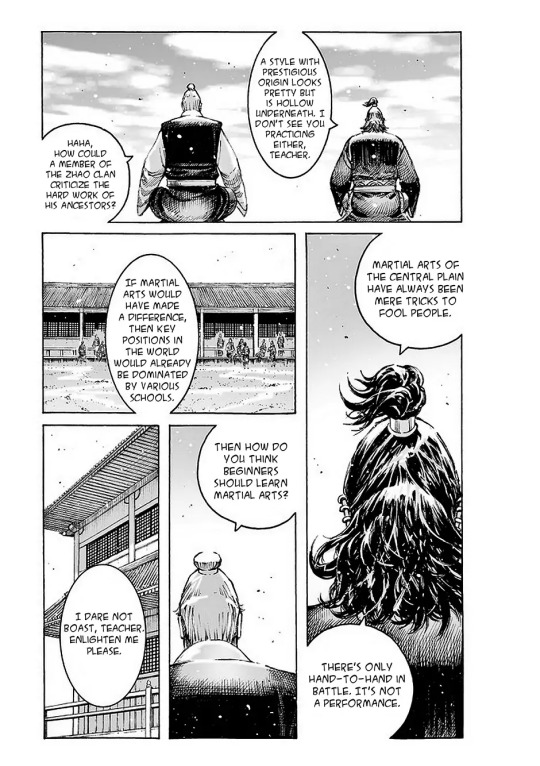
“what we need to learn now is observation and patience” – still paid off in Huo’s case and so it did for another Yun as well, as he was busy all these years, observing not only the human nature but the hidden meanings and uses of certain things, such as the literature as a tool of lying (“you won’t understand history without knowing how to lie”). This also foils how Zhuge was “waiting” and cultivating the illusions about Liu Bei for all these eleven years.
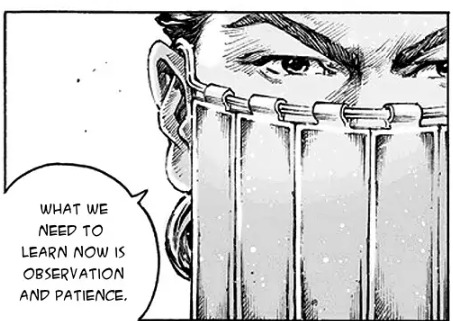
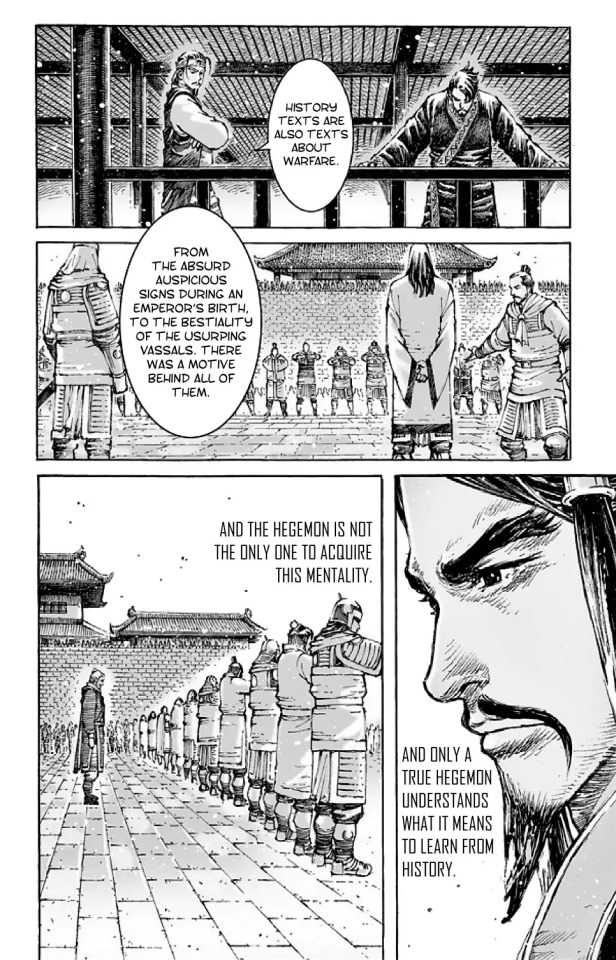
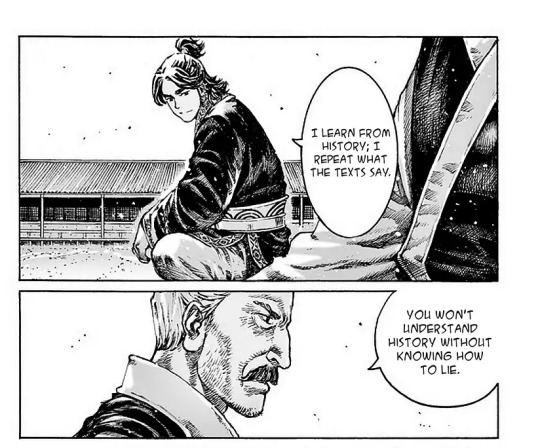
It is quite ironic and contradictory when 8th is talking about how important it is to know “where one stands” and yet he lacks identity and that helps him to stand (“infiltrate”) in any faction, at the same time. But us not knowing the identity of 8th further empowers my approach. Matches well with Huo trying to suppress his emotions and forget himself, thus becoming numb and losing his identity, as he won’t even get credit for his heroic deeds.
Basically Zhao brothers can be seen as the Yun’s identity crisis, a conflict between his duality of nature (Fan – wanting a normal life with his loved one. 8th – wanting to go with Liu Bei). And Huo killed Fan by his own hand, so killing the “longing for a personal happiness” also took a life of his loved one at the same time, by 8th mirroring his hand.
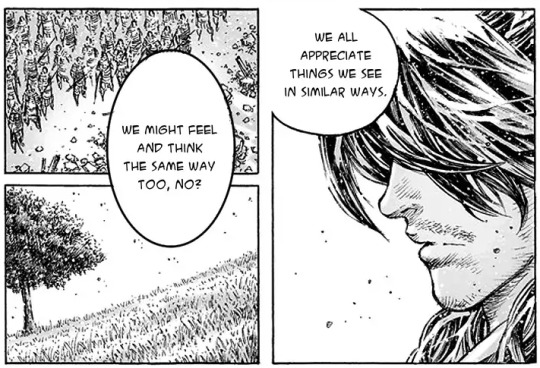
(8th casually hinting that both of them are named Zhao Yun)
The point of mirrored life is that he was always suffering, is currently suffering, will continue suffering, and would have suffered even if he were to make different life-changing choices in the past. But he will continue to live and will carry all the weight, as he already accepted it. It is as realistic as it gets – no matter what you are going to choose, the history is going to fix itself.
As to how similar 8th is to Liu Bei, we can talk about that right now. Meanwhile, 8th was judging the character of an assassin, Liu Bei was also being busy by judging the character of another Zhao and that, you guessed it, allows US to judge 8th as the mirror of our Chinese Jesus as well. To begin with, it is implied that both of them have two oath brothers so that comparison is not really far-fetched.

On the surface, both of them are good at judging the characters and while they are at that, none of them are using their real identities, but the substantial difference between them is that – Liu Bei is using the identity of being the cult of a personality, while 8th is not using any identity at all; Liu Bei is giving away a sincere brotherly love, thus gaining help from them on their own accord and that is something 8th is alien to (Zhao Fan was enslaved to his desire, rather than the aspiration of his brotherhood).
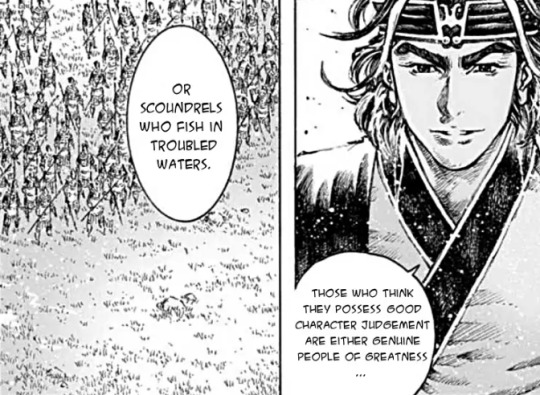
Now it should be noted that even if Liu Bei is getting a warm love and help from his oath brothers is a good thing, of course, Chen Mou has not forgotten that even such kind and heartfelt intent/actions can be harmful to the lofty aspirations. I also daresay that there is a great potential of showing the enormous flaws behind saving the world as a cult of a personality.
The first is directly connected to the relationship between the “savior” and the masses – there will be a part of people, who will have an urge to completely become reliant to the “shelter” that was provided to them and not only lose the sense of individuality in the process, but also get so soft in the process that they won’t be able to stand on their own again so easily.
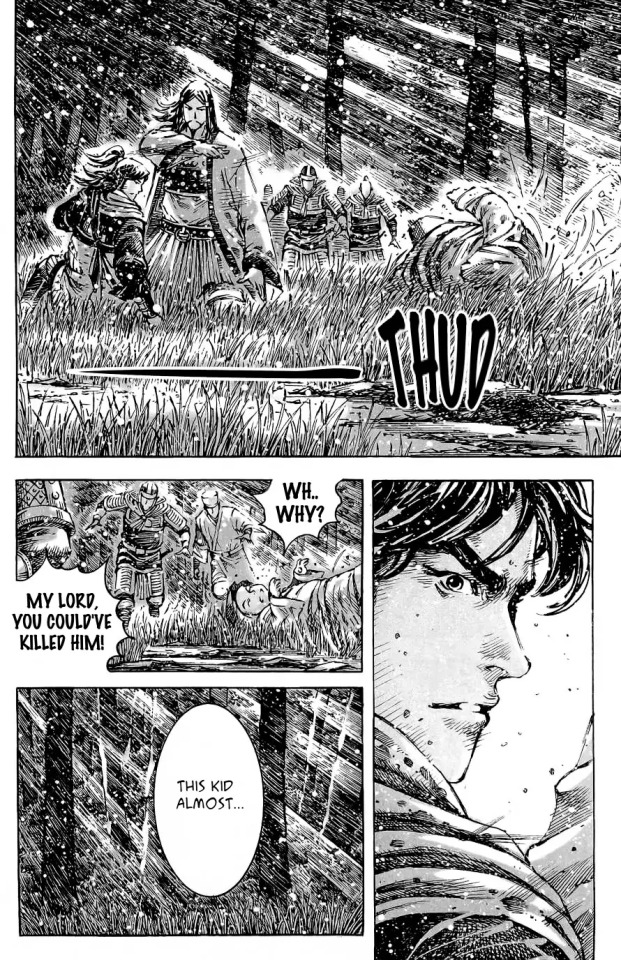
The second problem comes exactly from that and both of these could be depicted in RoT through Liu Shan’s character arc – for the world to be shaped as in the eyes’ of Liu Bei, he has to alienate himself from the garden of earthly delights and the human beings themselves, thus he himself will become a tool, who will only be able to care about his comrades-in-arm. After all, he values them more than his own son.
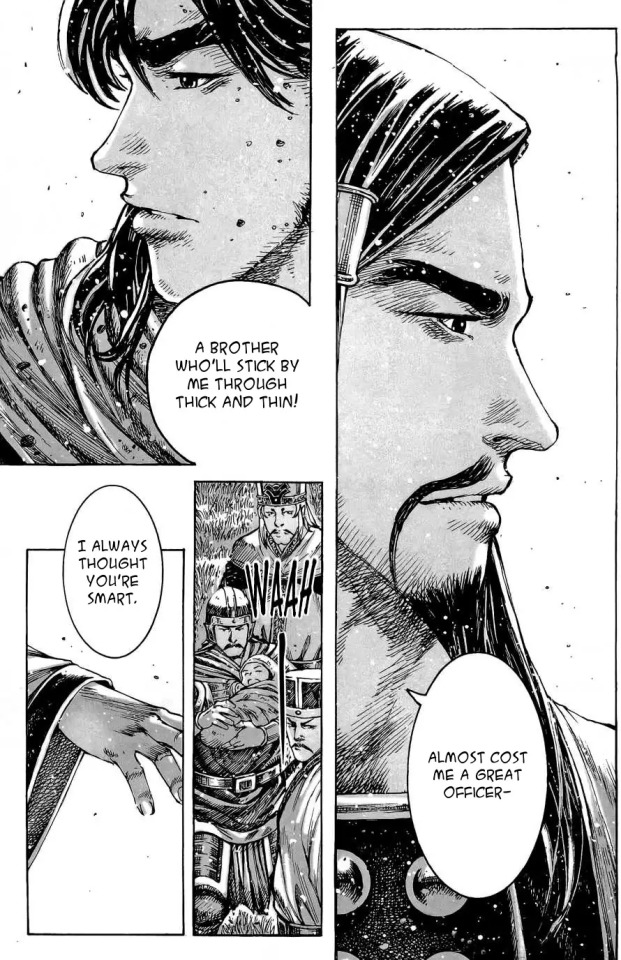
Right in the queue is standing a dragon (aka, not human) Zhuge Liang, who will also drag Liu Bei’s son to the moon. Moon of course represents the principles of Zhuge Liang and he is going to nail them in Liu Shan’s mind so much, that there will be no one to take the child on earthly adventures to gain necessary experience about the reality and human interactions. After all, Liu Shan is neglected to the point of being used in schemes even as a child. Although the role of Sun Shu in this ordeal is still a mystery.
One thing is clear – without Sun Shu, Liu Shan is going to become an anti-thesis of 8th’s ideology.
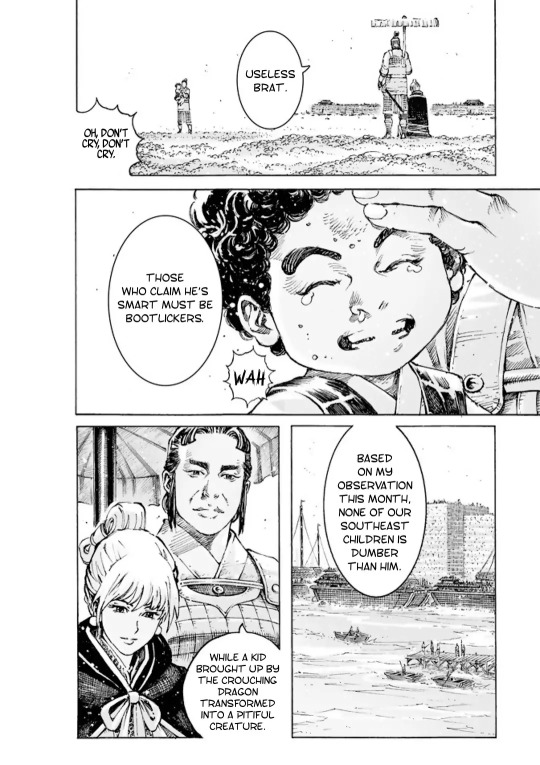
To have a clear idea and understanding of what I am talking about, you could always watch that Ghibli movie named “The Tale of the Princess Kaguya”. The Emperor there is so out of touch, he is not even aware that he should not touch women without their consent.
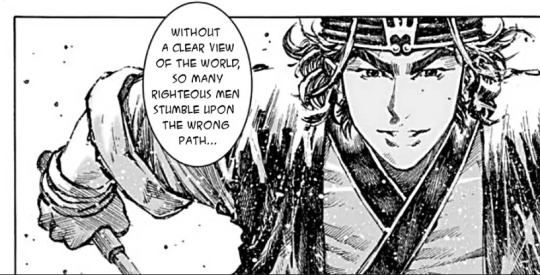
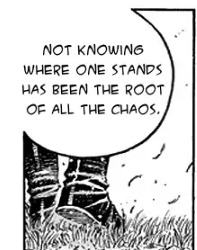
8th’s ideology won’t result in such degradation, but Liu Bei has his own arguments against that world-view. If 8th blames people for having the delusions of their own grandeur, Liu Bei says that people have delusions not about their own selves, but about the world itself, as to how it is “structured”. So, people are not defiled, they are just following the wrong path and guidance could fix that. Zhao Tong depicted as someone who is not being as educated and well-read as Liu Bei further nails the point.
(Thanks to the translator Merc, who told us that this idea was conveyed through the wordplay that was lost in translation)
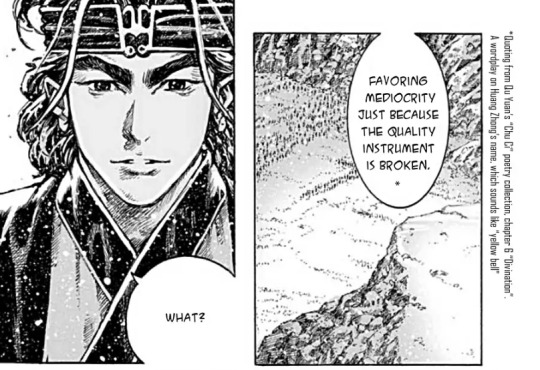
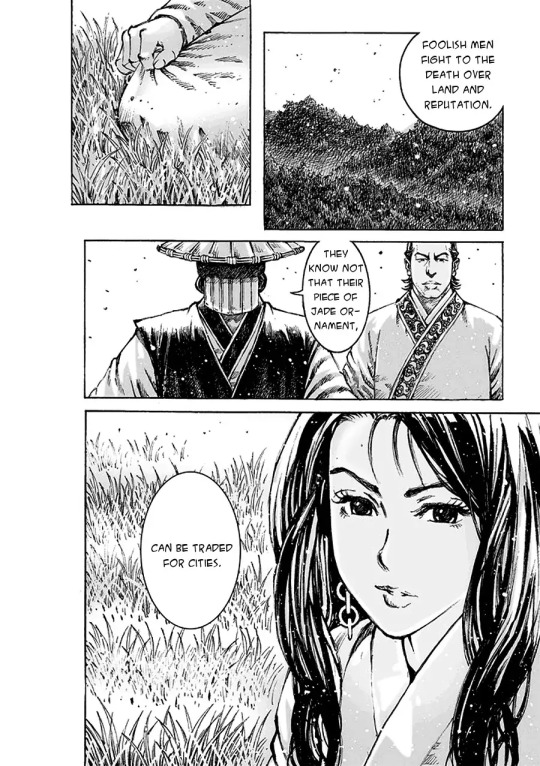
Surely, they won’t settle about the definition of the right path so easily. If 8th thinks that people should start valuing whatever they have and whatever they are able to do. Basically, the idea of saving the world won’t ever be fulfilled, because the world will only be saved after people save themselves – Liu Bei answers that one does not have to choose necessarily a mediocrity (in 8th’s case, broken people that he chose, such as Xiao Fan) and give it a value, just because the world in their eyes is ruined. Basically, gems still can be found in every corner, but they won’t polish themselves, so the world is still worth saving and could be saved if only we showcase what they can value.
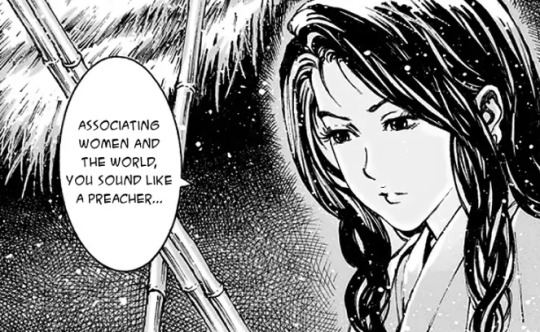
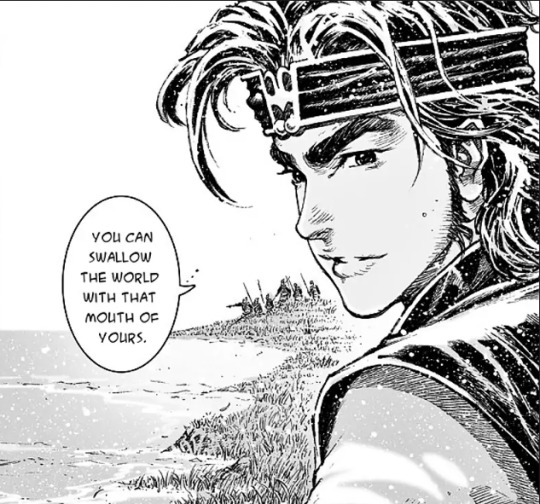
In short, 8th thinks that everyone could have their own things to find value in, but Liu Bei wants to create one general “shelter” that everyone will find value and solution in (and our boy Huo got both)
What makes the feud between 8th and the Shu compelling could be summarized in two features
1) When Cao camp is full of elite soldiers who were trained for what they are doing and Sun clan is fully family oriented and thus chains the family members, Liu camp is full of opportunistic individuals that choose their path on their own. On face value, 8th should be quite fond of them, but divergence comes when the said individuals view someone else’s path as something grand and enslave themselves, forgetting to why even they want a better world and are sacrificing themselves just for someone else. Despite that, they still remain as somewhat respectable in the 8th’s eyes.
2) The inherent duality of men, as both of these approaches find their justification within the human nature and, at the same time, it also serves as a counter-argument to each other – in times of order, people are going to seek disorder and in times of disorder, people are going to seek disorder, hence comes the pivotal point in the dynamic between 8th and 7th – If one wants to make use of human’s longing for peace through crafting the fake cult of personality, which will achieve stalemate and turn into status quo, another one wants to make use of human’s craving for desire through the dispersion of their delusions of grandeur first, by which people would lose interest in waging meaningless wars over meaningless lands and reputations.
After all, “winner takes all” is but a surface level aspect of how Ravages of Time deals with its roots - Poetic tragedies, with proper emotional baggage to convey the horrors of war and an exploration of the inevitability of history and the meaninglessness of our struggles when confronted with it.
Of course, we are not finished here, because aside from Shu, 8th has enough potential to foil Sima clan as well.
Let us start with Sima Yi himself. I'd argue both are exceptional men from powerful clans destroyed by forces beyond their control. Sima Yi being set up by Pang Tong and Sima's destruction changing him irreparably into a darker man. Like Hamlet the main driving force of the story is his revenge and just like Hamlet his actions unknowingly cause a similar tragedy to his own occurring. Sima Yis actions destroyed the Zhao Clam just like Pang Tong eventually destroyed the Sima as a scapegoat. Both attempt to gain revenge and return their clan to greatness. Yet while Sima Yi joins a future kingdom the eight opposes one and fails with his oath brother being forfeit. The irony being that Sima Yis entire life changed by one tragedy yet he doomed another man like him to the same fate unwittingly at the very start of the series. One was Zhao Yuns best friend while the other is arguably his most dangerous enemy now. I think there's a surprising amount of similarities and parallels between the two even this early. Oh, and both killed a woman Zhao Yun loved. Sima Yi by inaction and the eight in a moment of direct revenge. I'm perhaps not articulating this the best but the aptest dramatic comparison I can think of is he's the Leartes to Sima Yis Hamlet. Whether they will end up having the same conclusion as those two characters is up in the air though.
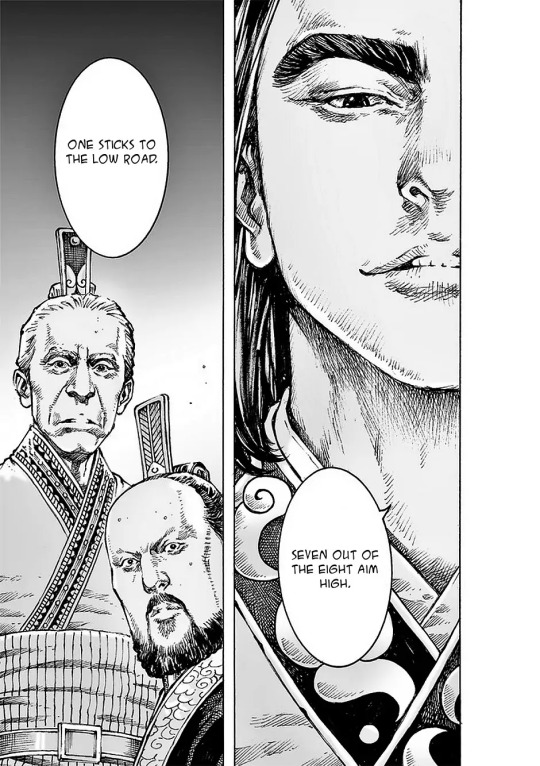
And meanwhile, 8th was concluding his not-so-grand spectacle, another member of Sima clan was introduced in the story – Sima Min, who is also an eighth member, rather polite and even was detached from other seven for quite a while and are considering as some kind of anomalies. After a line “seven out of the eighth aim high. One sticks to the low road”, even comes a hat of the 8th, whom we, in fact, described as someone who stands out by sticking to the low road. If I were to speculate, Min is going to be the one defending his own brothers, but 8th is going to be the one attacking his own brothers.
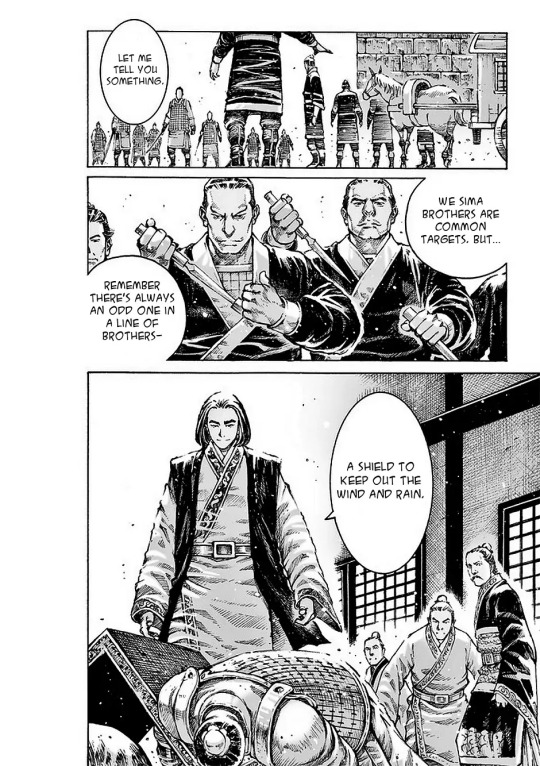
Both of them also serve as the premises for the next arc, even if they are not participated much in it, as of now: “Breaking the tradition” and the lies behind the books about warfare.
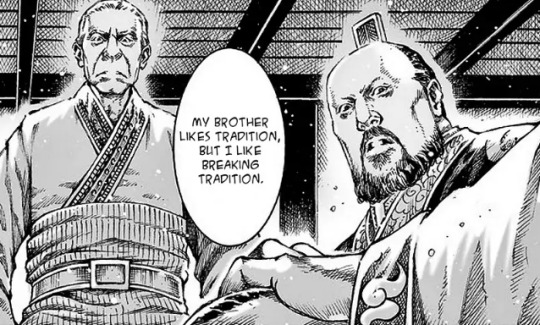
Now let’s come back to the long-postponed theory-crafting of mine.
-In the 468th chapter was revealed a dungeon that was used for torturing people. It belonged to the 8th who was gathering information about the routes of Shu. Then in 483 was revealed that Zhuge Liang had the exact same dungeon.
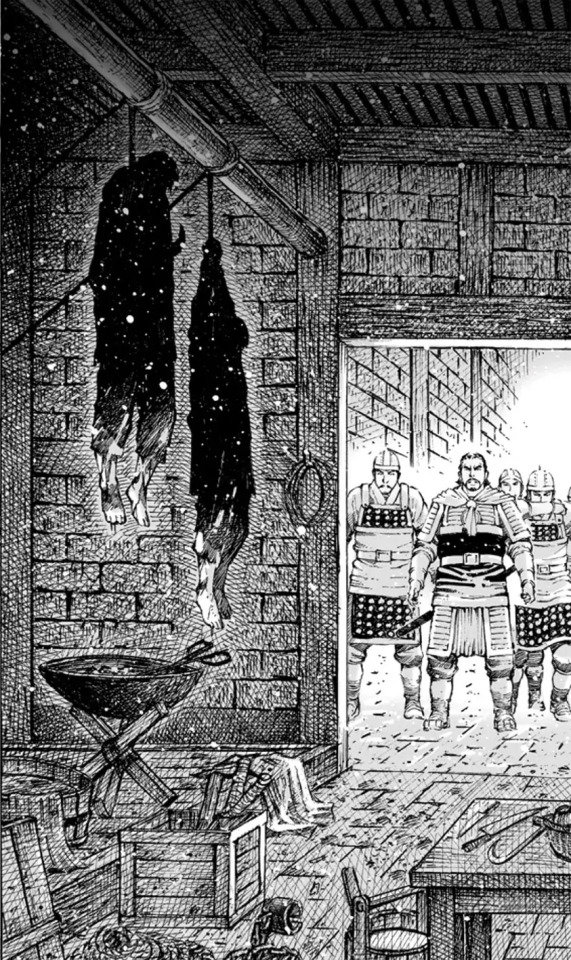
-In the 480th chapter on the other hand was revealed that Zhang Song was brought a fake map and thus Zhuge, who thought that Song was aiding Cao Cao, set a trap for him. There was someone special near Liu Zhang who was manipulating the information as if Liu Zhang was incompetent. That was a trap for Shu.
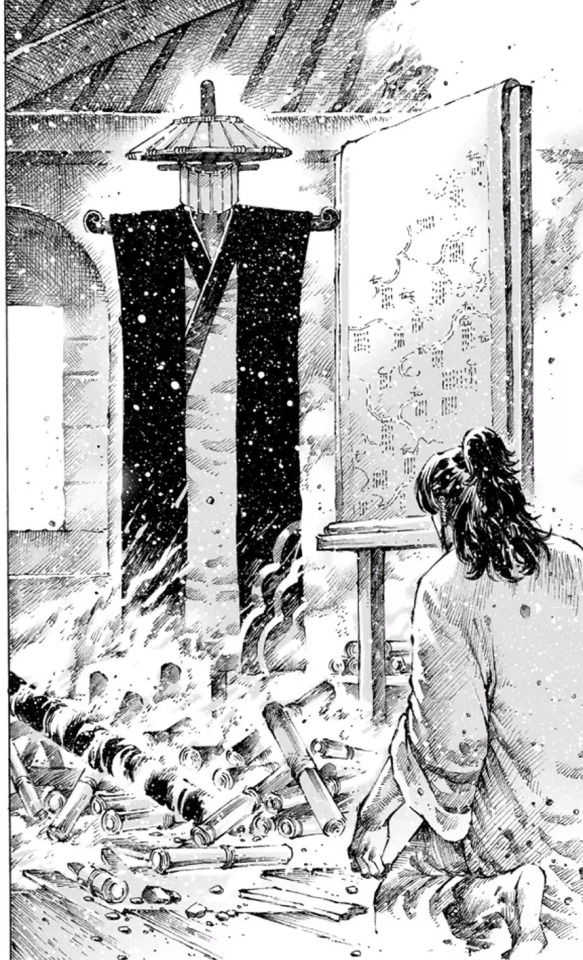
-Now in 483th Zhuge started a discussion about Zhang Song and 8th at the same time. After all, in the 468th chapter was also found a map, which was most likely made by the 8th. Key point was, that both of them were made in the same style, thus were made by the same person. The difference was, that the map made for Shu was fake, and the map made for 8th – was legitimate.
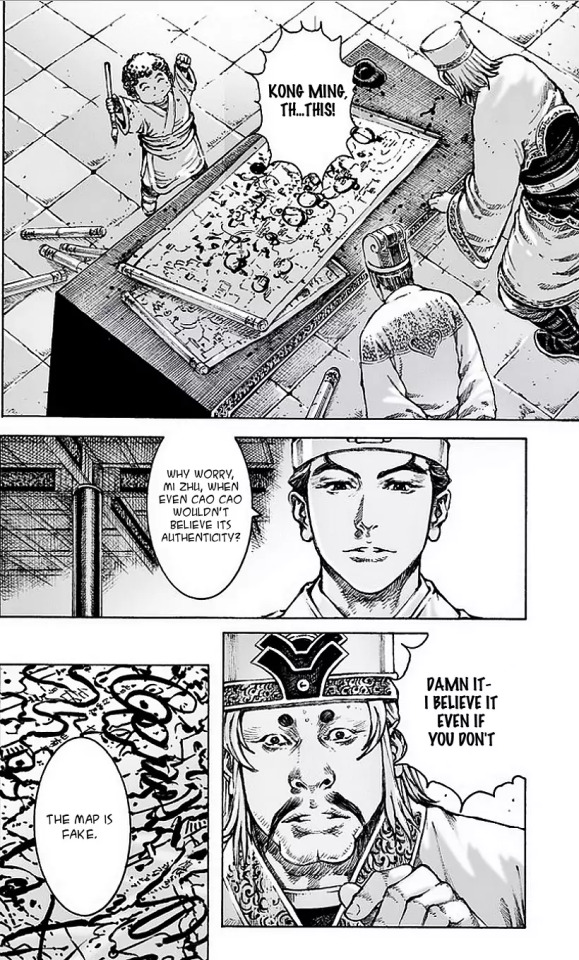
-At the start of the 483 chapter, Zhuge mentions how hard it is to track 8th and unless he announces his name, no one will know and yet, as a result of what was mentioned above, Zhuge deduced that 8th indeed graduated. Meaning, he has actively participated in the ravages of time already.
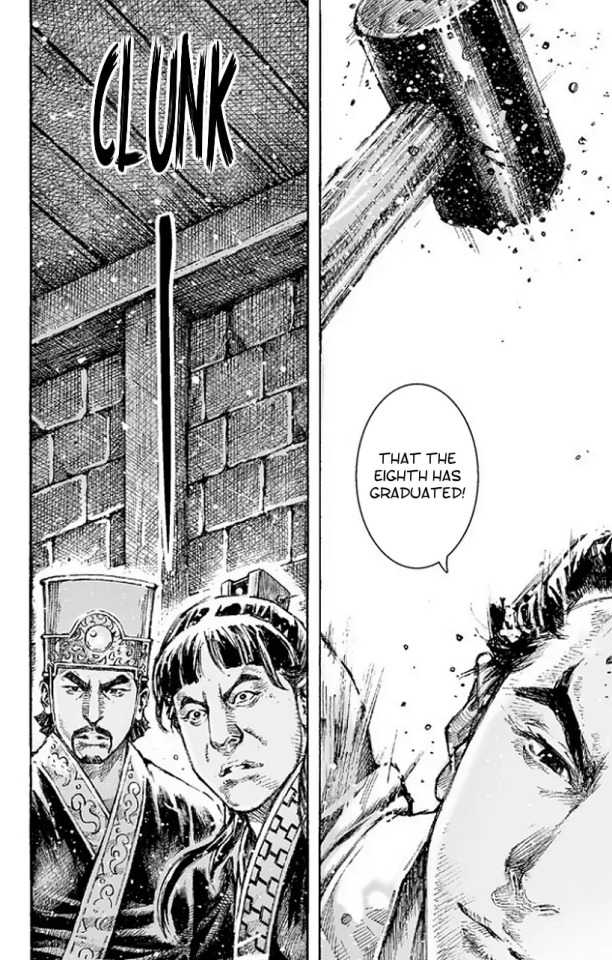
-In 483 Zhuge also did deduce that this man was merely “named” as Zhang Song. Meaning, his actual name is different. Now, how did 8th managed to convince him to not reveal that even after the torture session is a mystery. I can only think of “eccentric magic” (which I think is exactly what 8th needs for his plans, but it is also something that he wants the least) or heavy psychological pressure (considering that one guy with the damaged psyche in his chamber, chapter 468)
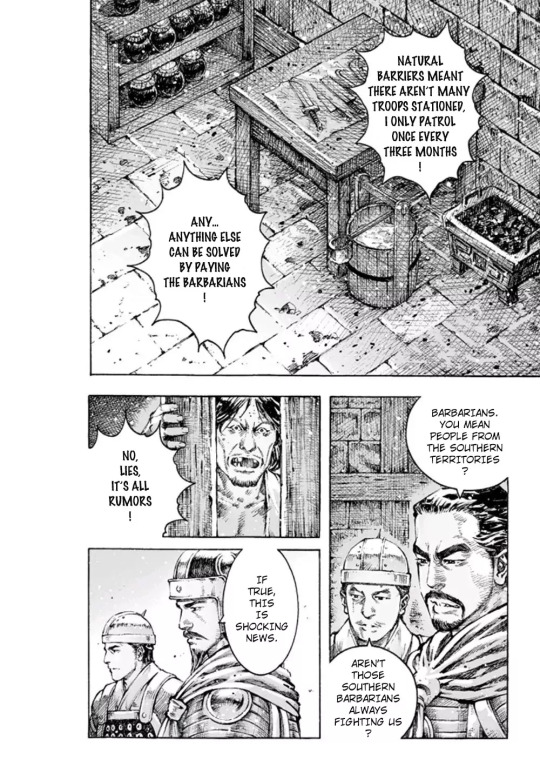
-Even more interesting came into the play after several chapters. It was revealed that there is another Zhang Song, who was aiding Ma Chao (who was also getting help from the Sun clan) and whose face was not revealed suspiciously. Why would there be several people with the same name? That’s rather CLOUDED (excuse the pun). One thing is certain, 8th is behind Song tricks, whether he is the one using that name, is actually named that or is cooperating with original Zhang Song – is another mystery. Zhuge did ruin his plans AGAIN (was it the third time?), but he still is cultivating his influence.
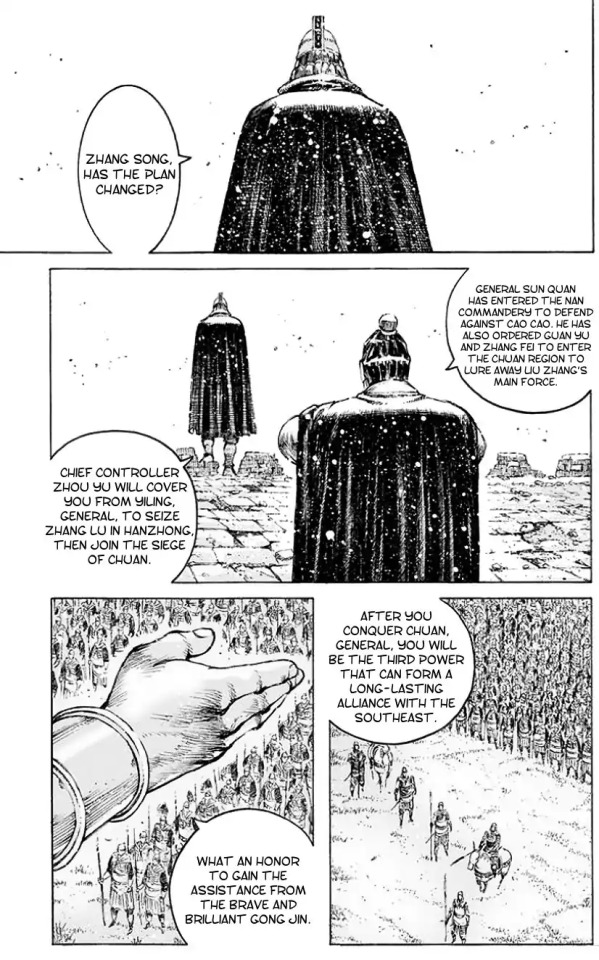
To conclude the analysis, let’s get back to the titular topic with a little hierarchy.
On the first level, there are stories with a black and white morality. Usually, black side is cartoony cynical, with no redeeming qualities and white side is cartoony idealistic, with irrelevant flaws (being hot-blooded and etc) – and the Ravages of Time even features such “stories” in deceptive schemes and labels them as “propaganda” (social commentary)
These “black” sides sometimes tend to be “justified” as if they were realistic (for example, for some reason, it is ok to have such characters if the setting is in the middle ages). Such explanations completely ignore the fact that no fiction is realistic and that every “realistic” being has redeeming qualities.
On the second level, there are stories with seemingly grey morality, through the presentation we do not actually see this moral ambiguity, so the presentation falls apart just because the characters’ words (what is talked) and actions (what is shown) contradict each other so much, that story does not seem self-aware anymore – a prime example would be a good guy, who wants to achieve a stalemate, but his actions tell otherwise and no one is actually calling him out on that hypocrisy. Also, everyone he faces is clearly inferior to him from a moral stand-point.
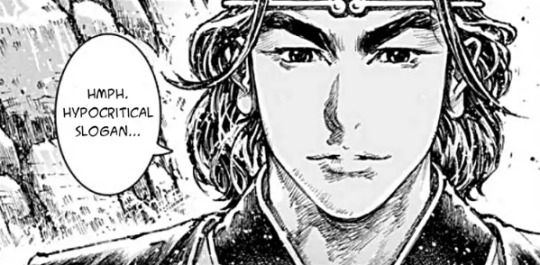
In such stories “black” sides may even have characters that were abused and victimized in childhood and now they are apparently pointing out the flaws in the system by blatantly indulging themselves in atrocities (for some reason). This is not only a cheap emotional manipulation but completely superficial and immature, as they are whining about the system by being worse than it and do not offer any solution to fix the system or a better alternative – they are merely amazed by the fact, that the world is imperfect and cannot accept it.
On the third level, there are stories with seemingly grey morality, but now they are doing the opposite. Characters constantly talk about the loss of humanity for the greater good, but they never commit to it and even if they were to do some questionable things (that most likely are glorified), they would still whine how bad the “greater good” is, despite not finding (or even trying to find) any better alternative. Here lies a huge contradiction in the presentation – It is preachy propaganda of “necessary evil” and, at the same time, does not want to acknowledge it, thus the story has a hypocritical point.
In such stories, “black” sides tend to be THE flaws of the system, with no redeeming qualities. They will be one-dimensionally incompetent and just abuse their power just for the main characters to have an excuse to commit “necessary evil”. In such cases, people tend to close their eyes on them being one-dimensional “as soon as they fir the narrative”. Such readers/watchers forget why it’s relevant for characters to not be one-dimensional – it is not realistic, considering you can be a flaw in a system and still have positive dynamics to something/someone else. It also lacks artistry, considering how crystal clear will the stance of the author is going to be by implementing such cartoony characters in his story. So… if the writing is so implausible… how are we supposed to trust the author on his beliefs and preferences, if he can’t implement said beliefs and preferences in an organic way even in his own world?
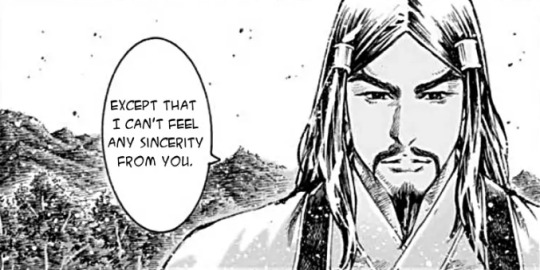
On the fourth level, there are stories with actual grey morality, where every character AND organization has its pros and cons properly presented. Without further complications, focuses on two sides of the conflicting ideas and naturally tells a realistic story, full of plausibility (Eureka Seven and Terra E, as examples)
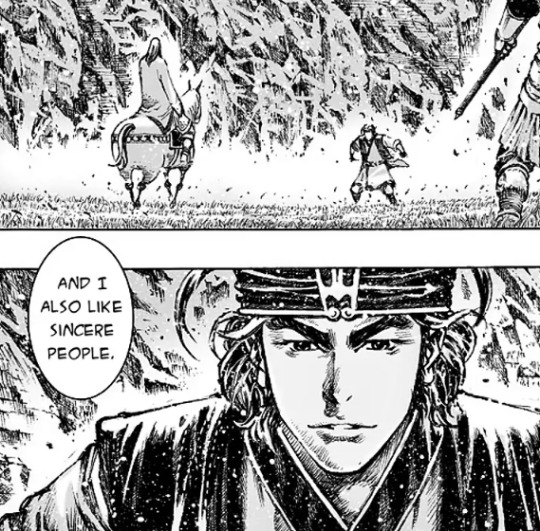
On the fifth level, there is the Ravages of Time, conceptually exploring said contradictions. It not only has more than two sides with full of characters with their own agendas, but they all are making use of various “contradictions” and that is something I wanted to highlight through the Eighth Genius, who is full of contradictions externally, but fully self-aware internally.
Now it is not outright said that contradictions are bad. Quite the opposite – even if they are full of shortcomings, they are also full of benefits and if everything can be used your and someone else’s good, why would contradictions prove the exception? After all, if any effort is futile and doomed, what it all meant to you and how content you were at your death’s bed is all that matters. Which is another contradiction, because on face value, there is no objective reason to do anything if everything’s meaningless, but at the end of the day, you at least accumulated the experience for the future generation, who will also have to postpone the passive decay of the world (but the said shared experience will lead to even more bloodfest, which is unfortunately inevitable in any case)
Failure of self-loathing stories is not seeing beyond the fixed framework. Ravages’ point, on the other hand, is that – contradiction, like anything else (for instance, loyalty), is simply a method and it was set as a framework to fit someone else’s agenda. Of course, merely trying to step out of a framework is not enough, as you are going to meet others who already did that. That’s exactly what’s so alluring about this piece of art – it not only examines a single contradiction with a hopeful solution (Self-loathing Zhuge not raising Liu Shan as a hypocrite), but offers plenty of other alternatives.
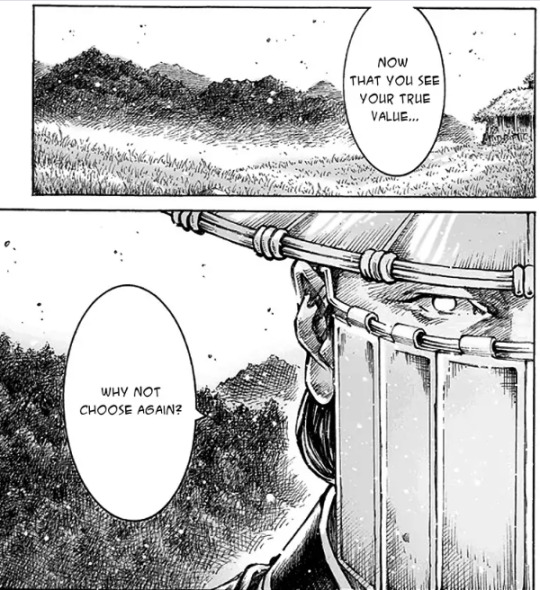
15 notes
·
View notes
Text
Leaving Canon Behind
If you’ve seen this post and this post and this post you probably saw this coming:
I’m officially unmooring Young Justice: Deathly Weapons from canon beyond Season 1.
I used to have some patience for Season 2. I like a few of the new characters and, while a lot were frustratingly underexecuted and wasted their potential, I did think some of the ongoing character developments could be interesting.
But the more I think about it - especially with the context from Outsiders - the more unhappy it makes me. I’ve though about how you might fill in the seasons, what would have to happen to get them to that point and reconcile the character inconsistencies, and it just feels so depressing.
Season 1 gave us a team of teenagers who wanted to prove something and did. They made mistakes and butted heads, had insecurities and kept secrets but ultimately they learned to trust each other and communicate, and found a place where they could be accepted for who they were and genuinely make a difference.
But then the timeskip happens and when we come back, they barely feel like friends anymore. They haven’t learned from the lessons of past seasons, they rarely communicate before it escalates to a fight, they don’t trust each other even when they have no reason not to, they rarely spend time together and the new characters have such little development, screen-time and chemistry with the old cast that it doesn’t feel like they’ve forged any genuine relationships, let alone ones strong enough to replace the bonds they’ve lost. (Tim Drake is Robin because he’s Tim Drake in the comics and no time is given to his character or relationship with Dick beyond that - and the same for Jason, Babs, Cassie, Steph, Raquel and 90% of the newer cast who you’ll only understand or care about if you already care about them from somewhere else). Somewhere along the way they all just drifted apart, went through so many terrible things that they broke, forgot themselves, forgot their friendships, forgot what they’d learned, and instead of healing or growing or coming together they came back so much lonelier and unhealthier and unhappier as people.
And then Outsiders makes it all the worse. They again haven’t learned the lessons of the mole plot, none of them meaningfully communicate outside of arguments, Conner and M’gann never properly resolve their relationship-breaking conflict from the first timeskip, what happened to Wally is completely timeskipped over except for Artemis and Dick who mourn in the most trite, generic, impersonal way possible with no care given to who he actually was or the details of the relationships they actually had. They don’t respect each other, don’t trust each other, don’t even really seem to understand, take the time to reflect on or try to know each other anymore.
Dick, Bruce, Kaldur and M’gann are at this point liabilities to the League; willing to distort and subvert their positions, misuse their power for personal gain or as they see fit, lie to the people closest to them, manipulate younger heroes, reduce their colleagues’ autonomy and deny them the ability to give informed consent, and avoid accountability for their own actions. And considering how little the lessons from prior seasons have stuck in the past there’s no reason to believe they won’t do so again. I never thought I’d reach a point where it feels like the heroes would be better off without the original cast.
Meanwhile the villains’ long-term plans are contradictory, unclear and incoherent. They don’t destroy the League in Season 1 because they apparenlty “need them”, but then they don’t do anything to capitalise on their disorientation or further their plans for 5 years (except for Klarion taking a short side trip to do some magic-tablet shopping so that a poorly-rendered videogame can happen and they can retcon-canonise Kaldur’s father and Tula’s death), because they’re supposedly waiting on some uncertain alien arrival that ends up endangering the world they want to rule, but then in Season 3 they want to regulate metahumans and we see Klarion knows how to activate meta-genes with magic so if they already know about that then why not use Starro to frame the League and get that ball rolling in Season 1? Earth already has a galactic presence so why do they need to rely on random, incredibly hard-to-predict aliens? How on any planet does the uncontrolled abject chaos of Outsiders benefit their supposed “evolved earth” in any way? It’s impossible to figure out the stakes and tension of a win or loss when no-one has personal goals and the final prize is so unclear.
In the end, this is a show about hopeful, promising, collaborating teenagers who grow up to be miserable, isolated, irresponsible, emotionally immature adults whose complete failure and refusal to trust or communicate with others costs them the very team they worked to create. About increasingly underdeveloped, inconsistent, narratively interchangeable and uninteresting characters who you’d barely know were friends if the story didn’t insist it was so. About a world that’s getting worse and more volatile, less worth saving with each season. About villains whose plan doesn’t make sense and who have only not been stopped because the heroes are so apathetic and unmotivated that they’ve never tried to proactively uncover or counter their long-term strategy.
A story that ultimately goes nowhere and says nothing, dragged out at the hands of creators who openly don’t want to give it an actual ending at all. All the problems with Dreamworks’ Voltron and BBC’s Sherlock and Tite Kubo’s Bleach rolled up into one great crescendo of cynical, uncaring, wasteful narrative tragedy.
As a fan-author, I can’t bring myself to do this to these characters.
I’m upset because I can’t do anything to change the course of canon. I’m not a shipper, I’m not a theorist, I don’t expect specific things to happen... I just wanted some quality, some answers, for any of it to mean something. But I couldn't even get onto their horribly anti-consumer streaming service to support it officially back when I still hoped for a turnaround. I can’t make Weisman or Vietti or their creative team or the DC executives care about narrative construction, this story, or make them respect their audience and characters. And at this point even if I could the show’s just too broken to salvage.
All I can do is take the parts that had potential and try to make something different.
#That's it#I'm officially out#I'm done dwelling on and being mad about disingenuous condescending lazy writers and their disingenuous condescending lazy choices#Since they aren't going to be bothered respecting or putting out quality work I don't feel any need to respect or listen to their opinions#If I start making errors in details about Season 2 in YJ:DW don't bother correcting me I have not am not going to rewatch it anytime soon#3WD#Young Justice#Young justice: outsiders#young justice salt#Grandon Salt#Outsiders salt
34 notes
·
View notes
Note
please say a lot about the Tony and Steve fight in Endgame, my petty heart demands it
My petty heart supplies (a bit late)
So my issues with the fight in Endgame basically break down into two parts: 1) the justifying of authoritarianism and 2) completely ignoring previous canon, including what happened in Infinity War, a film not only made by the same creative team but at the same time.
1) Justifying of authoritarianism
The scene is framed as if Tony is in the right. Tony is hurt, Tony has been wronged, Tony is right to push back against Steve and the others who failed to prevent Thanos’s final victory. They are all swayed in-scene by his argument and no one offers any rebuttal to lines like this one:
“And I believe I remember tell all you, alive and otherwise what we needed was a suit of armor around the world! Remember that? Whether it impacted our precious freedoms or not - that’s what we needed.”
Yikes. First of, yes, freedoms are precious. Just getting that out of the way.
Two, we saw Tony’s suit of armor around the world - Ultron, which took control and nearly destroyed the Earth. We saw another that he contributed to - the program in Winter Soldier controlled by HYDRA-infiltrated-SHIELD.
And even if those two things didn’t become instantly corrupted, they still would have been wrong. They still would have taken away people’s right to privacy, their free will, their ability to determine their own futures. (The surveillance program was intended to ‘eliminate threats before they happened’, completely discounting choice, and free will, and redemption.)
So yeah. Those freedoms are precious and Steve was right to challenge those structures being put in place. (Which was really his motivation in Civil War - yeah, sure, Bucky played a big part in his actions, but before Bucky became involved he was already anti-Sokovia Accords.)
2) Forgetting of canon, particularly the question of “What was Steve doing?”
This is the part that really pulled me out in-movie. Because it was so inconsistent I was just like ‘wait...what? Don’t y’all remember what happened in IW? I feel a little bit like I’m going crazy over here?’
Steve: “We’ve been hunting Thanos for three weeks now. Deep Space scans, and satellites, and we got nothing. Tony, you fought him.”
Tony on Steve: “I said, ‘we’d lose’. You said, ‘We’ll do that together too.’ And guess what, Cap? We lost. And you weren’t there.”
Um. Steve also fought Thanos? Like...with his fists? And a whole army in Wakanda. He was literally right there for the losing bit. He watched half of his friends turn to ash. And no one calls Tony out on being wrong...ever. I can understand maybe in that exact moment, because he’s hurting and sick, that people aren’t going to really go at it with him, but at some point they have to address the fact that Tony was very wrong about where Steve was and what he was doing during the lead up to Thanos’s victory.
And the ‘where were you part?’ is also damning because they forgot CW/IW canon - that Tony had the means of contact Steve. And he didn’t. Steve reached out with the apology letter, and the phone, which is how Bruce ultimately contacts him.
And no one ever points out this inconsistency. The narrative frames Tony consistently as being in the right. We’re expected to accept that he is the wronged one in this scene, that Steve should be chastened. Which...he’s not. Setting aside your opinions on authoritarianism (which hopefully are...against authoritarianism), these points are just factually untrue. He was working...quite hard to combat Thanos and lost quite a bit.
Tony, by contrast, did not reach out to Steve when he could have, did not actively try to understand or combat Thanos (he says “Pfft! I saw this coming a few years back. I had a vision.” but did nothing) aside from supporting programs that would have limited or entirely taken away fundamental human rights, and then...didn’t lose anything. Up until this point at least - obviously he makes the grand sacrifice play in the end, but up until then, he loses no significant friends or family members. Just Peter Parker, his teenage protege. Steve, on the other hand, worked to maintain human freedoms, when presented with the material reality of Thanos collaborated with Wakanda to put up a decent defense, fought up with his bare hands, and then watched as his closest childhood friend and his new friend and ally, the one who was there for him when no one else was, were turned to ash right in front of him.
Steve offers no self defense in this scene. His last spoken line (barring Tony’s name when he collapses) is just after the ‘whether it impacted our precious freedoms or not’ line: “Well, that didn’t work out, did it?” The transcript I used (courtesy of Fandom Wiki) says, “Steve looks affected by Tony’s words.” He offers no defense to the accusation that he is a liar, though textual evidence proves he is not.
The whole argument was baffling to me. It was a lot. It was probably the first significant hiccup I had while watching Endgame, this sense of ‘...well, that’s not right...’
The rest of the film continues to support Tony’s point of view. They go to his home, meekly, to ask for help, instead of defending their actions. Tony is made to seem like he’s extending them charity when he figures out time travel and the way to reverse the deaths of trillions of people across the galaxy.
There have been a lot of great responses to my earlier #EndgameNegativity post, but one that stood out to me pointed out that Tony Stark really became the central figure of the Infinity Saga. And I know they needed one, and it was going to be difficult to accommodate the needs of fans who were all coming from different individual franchises...but it does in the end feel really that they prioritized Tony at the expense of the others. Lifted Tony up by putting the others down. Steve’s a liar, Thor’s a drunk, lazy failure, Clint’s a murderer, Bruce is a celebrity for some reason, Nat gets thrown off a cliff and doesn’t even get a funeral or more than 30 seconds of on-screen mourning.
This is not just about screentime but the way they were treated as characters. Like my favorite twitter thread reworking Thor’s EG storyline concludes (I’m sort of paraphrasing), “Every character is someone’s favorite. If you can’t respect that, give the job to someone who can.” Tony Stark, as an individual character and on his own merit, was no better and no worse than Steve Rogers, or Thor, or Natasha, or any of the others. It is disappointing that the final chapter of this saga concluded with a film that elevated Tony Stark at the expense of all the others.
The argument scene I feel, really exemplifies the way that Tony’s perspective was centered, at the expense of narrative consistency, characterization, and moral perspectives.
Thank you.
#i always feel like i have a good last sentence when i can say 'thank you' at the end#endgame negativity#tony stark negativity#again! liked tony stark originally!#currently frustrated by his centrality#and how no one acknowledges when he's wrong#or when he harms people#this got very long i am very sorry#veliseraptor
77 notes
·
View notes